
Disclosure: This article contains affiliate links, meaning that when you make a purchase, I earn a small commission. For more information, see the site Disclaimer .

College Visits for Juniors: A Perfect Time for Campus Tours
Are you wondering when to do college visits? Should high school juniors visit colleges?
College visits for juniors are ideal! (Although of course you can start visiting colleges at any time during high school!)
Campus visits are an important part of the college search process. Students learn what they like and dislike about different colleges and find out what college life might like for them.
Junior year of high school is a great time to visit college campuses. College visits for high school juniors will help them learn about colleges and decide where to apply.
During freshman and sophomore year of high school, students are starting to take advanced classes and trying out different activities as they prepare for college .
By their junior year, students have a pretty good sense of what subjects they like, what area of study they might like to pursue as a college major, and who they are as a person.
Then, the closer students get to their final year of high school, the busier their schedules are with sports, classes, extracurriculars, and friends.
Visiting colleges as a high school junior is the best way to to decide if a college is right for you. This blog post is all about why juniors should colleges, how to plan college visits, and what to do on college visits!

Why High School Juniors Should Visit Colleges
1. high school juniors are ready to see what college is really like.
Juniors in high school are pretty mature. They know what subjects they like and dislike.
High school juniors might have a sense of what they’d like to major in in college. They know college is just around the corner, but aren’t sure exactly how college will be different than high school.
College visits for juniors can help them see what college will really be like. Campus visits offer a glimpse into the many ways college differs from high school.
Juniors touring colleges can see what it’s like to live in a dorm and eat in a dining hall. Juniors can talk to professors and students about the academic rigor they can expect in college and how to prepare for it.
The campus tour guide will be a current student. They’ll share their experiences with classes, clubs, and college life, so that high school students touring the college will know more about what it’s like to go to college there.

2. College visits are Much less stressful before senior year
Waiting until senior year to start visiting colleges means that you will already be behind on deciding what college would be the right fit for you.
If you haven’t visited any colleges, it will be hard to know how you’d actually feel about attending the colleges on your list.
Will a large university make you feel lost in the crowd or excited about all the possibilities?
Will a small liberal arts college make you feel seen or stifled?
Will a big city campus make you feel energized or exhausted?
The college application process might feel more stressful because you’re not sure where to apply. If you haven’t narrowed down your list of colleges and researched them to be sure they’d be a good fit, it will take you longer to start your applications. You’ll also have to allow time for extra essays and scholarship applications.
Senior year is extremely busy. Seniors planning to go to college are probably taking several advanced or AP classes.
You might be playing a sport, participating in clubs, volunteering, or serving in a leadership role.
Of course, you’ll also be working on those college essays and applications. As a busy senior, finding time to visit colleges will be extremely challenging.
By visiting colleges as a junior, you’ll have time to visit more colleges. You’ll be able to reflect on what you liked and disliked about each one. You’ll have time to do more research and talk to students or professors about each college you’re considering.
3. Junior year college tours will help you plan your senior year
By visiting colleges during your junior year, you can find out what classes you need to take your senior year to help you get accepted into the college or a certain major.
You definitely don’t want to opt out of a class your senior year, only to then find out that it’s recommended or required by the college you want to attend.
When you meet with a college admissions counselor, you can ask specific questions and find out what you need to do to stand out as an applicant (like adding more test prep to boost SAT or ACT scores) .
4. Visit colleges junior year to help you plan college applications
By visiting colleges as a high school junior, you can decide what colleges or what type of colleges you want to apply to well before the fall of your senior year.
Visiting colleges during the junior year of high school takes the pressure off each visit because students still have plenty of time to finalize the list of colleges they will apply to.
You’ll also learn more about what colleges are looking for in their applicants. After visiting a college, you will be more inspired to write the essential “Why do you want to attend this college?” essay prompt.
Also, you’ll learn about the college’s timeline for applications and scholarships. An admission counselor might even tell you about some scholarships that aren’t mentioned online.
Visiting college campuses before you send in applications will help you choose to apply to colleges where you feel confident you’d be happy. It’s so important to learn what colleges you want to mark off your list and not bother applying to long before you start applications.

5. Learn what you are looking for in a college
By taking the time to visit colleges long before it’s time to apply to colleges, you’ll have better opportunities to decide what you do (and don’t) like about different colleges. When you finalize your list of colleges to apply to, you’ll know what matters to you.
College visits are a key way students decide if a college would be a good fit for them.
If you take the time to visit colleges as a junior, you’ll have more opportunities to decide what you do and don’t like, what matters most in a school, what size school fits you best, and what vibe you’re looking for in a college.
6. You won’t have to miss school your senior year
Tour colleges your junior year, during fall break, winter break, and spring break, so you can maximize how many colleges you visit.
Visiting colleges your junior year during school breaks means you can take a lot of college tours without worrying about what you’re missing when you’re not at school. Also, touring colleges on school breaks means that you can take a vacation and tour colleges all in one trip!
Visit colleges on summer break
You can visit colleges the summer before and the summer after your junior year of high school. Then, you can plan your college visits around your summer family vacations.
Summer college visits mean you don’t have to stress about missing school or making up assignments. Also, summer college tours allow more time to visit farther away destinations.
Summer college tours are nice, because you can space them out. If you’re visiting colleges as part of a vacation in a certain area, you can do other things, like the beach or museums, in between college visits.
Unfortunately, since colleges won’t be in session or will have smaller numbers of students on campus, you won’t see what the college is really like during the academic year.
However, college admissions offices try really hard to give visitors an authentic feel for the college. Feel free to ask your college tour guide what the campus is really like during the school year.
Visit colleges on Fall break
If you start visiting colleges your junior year of high school, an easy way to start is by visiting nearby colleges over your fall break.
Use your fall break to visit nearby colleges in your city, a neighboring town, or your state. Even if you don’t think you’d be interested in the school, take a tour.
Touring a nearby college will help you learn about college life in general and give you a sense of what you do and don’t want in a college.
Visit Colleges on spring break
Use your spring break to tour colleges, since you’ll have a full week off school. You can travel somewhere to visit several colleges. Or you can plan a quick day trip to see colleges close to home.
Spring break college visits will let you see what things are really like on college campuses because classes will probably be in session. Odds are that your fall or spring break won’t overlap with the breaks of every college you want to visit, so lots of students will be on campus.
Visiting colleges in the spring of your junior year can be particularly helpful, since you’re working on your college list and deciding where to apply.
7. Visit in your junior year if you plan to apply early decision
If you have already narrowed down your college list and are deciding where you want to apply early decision, definitely visit colleges before your senior year starts.
Before applying early decision you want to be absolutely certain that the university you’re applying to is the right one for you.
8. Schedule your College visits around your sports seasons
Planning your college visits as a junior gives you some flexibility to schedule your visits around your high school sport.
By planning ahead, you can visit all the colleges you want to see without interfering with games. You might even be able to schedule some college visits around travel games or tournaments.

How to Plan College Visits for Juniors
1. research colleges you want to tour.
As a junior, you may be just starting to think about your college list. If you plan to cast a wide net and visit lots of colleges, you can wait to do in-depth research.
If you know you’ll only be visiting a few colleges, I’d recommend doing some research before you go:
- Does this college have the major you’re interested in—particularly if you want to study a more obscure topic.
- What is most important to you about the college experience?
- How close to home do you want or need to be when going to college?
- Are your grades and test scores in line with students who are accepted at this college?
- Are you likely to be able to afford this college? Does this college give financial aid or merit scholarships that would make it affordable to you?
2.Determine how far to travel for college tours
First, how far you want to travel to take college tours might depend on a few factors. Do you want to stay close to home for college or go far away? How far away is too far?
For my oldest daughter, we literally used a compass to draw a circle on a map. We focused on colleges that were within an eight-hour driving radius from our hometown. That way, she was within a day’s drive of home.
Second, how much time do you have for college visits? Summers are a great time to make far-away campus tours part of your summer vacation plans.
Fall and spring breaks are perfect opportunities for college trips too!
But if you have to fit in college tours over long weekends, that might determine how far you want to travel to visit college campuses.
3. Maximize your travel
Visit clusters of colleges located near each other. Investigating several types of colleges and universities on one trip can help students quickly determine what they like and don’t like about different options.
You’ll find that big cities often boast several colleges and universities of different sizes.
In many rural areas, you’ll be able to find clusters of colleges and universities within a few hours of each other. Decide how many schools you want to visit and plan accordingly.
When it comes to figuring out an efficient travel route, Google Maps is your friend!

4. Visit colleges during the week
This is an annoying fact of college visits: even though they expect all parental figures to have a full-time job in order to pay for college, only a few schools regularly offer tours on weekends.
So, if you want to take a formal tour through the admissions office or see what regular day-to-day life is like on campus, you’ll need to tour on a weekday.
My tip is to decide on all the colleges you’d like to visit, and see which schools have tour availability. Then reserve tours and plan your schedule based on where and when you can book a tour.
5. Don’t visit Colleges on Holidays
Universities observe federal holidays. That means offices are closed and there are no classes.
Try not to visit colleges on Labor Day weekend, Thanksgiving weekend, Christmas week, or other federal holidays. If you do visit on holidays, know that there won’t be tours available and campus will be pretty quiet.
Also, you won’t be able to meet with the admissions officers or professors.
However, if you have to visit a college when it’s closed, and you can’t take an official tour, don’t worry.
Every college has a self-guided tour of campus available on its website! Even a stealth visit will give you a better understanding of whether a particular school would be a good fit for you.
6. Visit different types of colleges
Go to a large university and a small college.
Include a state school and a private college.
Tour a college in a city, one in a small town, and another in a rural setting.
You might be surprised to find that you like a college you didn’t expect to like!
7. Plan ahead
To make the most of your college visits, plan your visit well ahead of time. College tours book up quickly, so finalize your plans in advance.
Each college does its tours differently. Some colleges offer tours on the hour, every hour.
Some only offer two or three tour sessions on certain days of the week. Be sure to check each college’s website to see what your options are.
8. Set a budget for college tours
When you add up gas prices or airline ticket costs, hotel rooms, and meals out, college visits are pricey! And that’s not even counting the sweatshirts and other swag from the campus bookstore!
Before you go on tours, come up with a budget. Be sure the trip will be affordable for your family and try to minimize surprise expenses.

What Juniors Should Do When Visiting Colleges
1. participate in special tours of the college.
Colleges often offer special preview days for high school students. For these events, colleges roll out the red carpet to welcome prospective students.
Sometimes high school students visiting colleges for these special admissions events get free swag, complementary lunch, and special open house tours of academic departments.
Colleges may host info sessions, panel discussions, and conversations with a faculty member.
Find out if the college you want to visit has opportunities for you to take a tour of your academic department, meet with a professor, attend a class, talk with a coach, or have an interview.
These opportunities might not be offered every day and will require a reservation, so plan ahead.
Another bonus of these special tours is that they’re sometimes offered on weekends.
2. Take your time when you’re visiting colleges
You made an effort to get to the college. Take time to just be there and take in the vibe.
Spend time hanging out at the student center or sitting in the sun on the quad.
Try the cafeteria food.
Browse the bookstore.
Sit down on a bench on the college green and people watch.
Just take some extra time to get a sense for the culture of the college and how much school spirit you see among the students.

3. Explore the neighborhood or town near the college
Spend some time in the area around the college or the nearest town. Even if you just drive by, check out the neighborhood surrounding the college.
See what it might feel like to live in that community and the surrounding area for four years. Is it convenient enough to grab groceries or a bite to eat off campus? Do you feel safe?
4. Talk to everyone on the college campus
This is not the time to be shy!
Ask current students what it’s like to be on campus. Talk to the custodial staff and dining hall workers. Ask faculty questions about research options and academic supports.
Enquire about the student health center, mental health support, and accommodations for any special supports you might need.
Find out what greek life is like on campus. What type of events does the student life office sponsor? Are there a lot of volunteer opportunities for first-year college students?
Ask your tour guide hard questions. By talking to current college students and other people who are part of the college, you can learn a lot about the culture of the school.
5. Make a good impression
Be on time. Pay attention to the presenters, student ambassadors, and student tour guides. Ask good questions.
College admissions are competitive, so do whatever you can to put your best foot forward. Feel free to write a thank you note to your admissions officer and anyone else who was particularly helpful on your visit.
College admissions counselors usually just conduct formal admissions interviews with high school seniors who have already applied. However, you’ll probably speak informally with admissions staff.
Be ready to ask a few questions about the admissions process or specific programs you’re interested in.
6. Ask about financial and merit aid
Now’s the time to find out if this college will be affordable to your family or not.
Before you get too heavily invested in any college, be sure that the final price will be one you can afford.
It’s better to find out before you apply that you can’t afford a certain college so you can choose a different, more affordable, school to apply to. Be realistic about the school’s affordability.

7. See all the places on the college campus
Eat a meal in the dining hall. Browse the bulletin boards in the student center.
Check out the academic buildings. Explore the library.
Peek in the gym and see what the athletic facilities are like.
Go everywhere on campus (that you’re allowed!) and see what it would be like to live there.
8. Go virtual
If you can’t visit a college campus, take a virtual tour your junior year of high school. If you’ve already visited but need a refresher on the college, take the virtual tour.
Other ways you can get an inside look at what a college is really like (without being there) is to look at college, department, and club social media accounts.
Also, stream the college radio station, read campus newspaper, and browse department websites.
For international students or if you live far away from the colleges you want to visit, virtual college tours are a good opportunity to see what a college is like. Colleges provide really good alternatives to in-person visits to really show what campus life is like.
9. Take notes on the experience
It may seem weird at the time, but you’ll be glad you did.
Write down key thoughts to help you remember the visit. Note the name of your college tour guide and of anyone else you met with (an admissions officer, professor, department chair, etc.).
Send your admissions counselor an email with follow-up questions or information. If you’re visiting colleges as a junior, you want to be able to remember the details of the campus tour when you’re a senior making your final decisions.
10. Take photos on your college tour
Be sure to take lots of pictures of important things you want to remember.
Definitely take photos of a dorm room, the outside of the dorms, a classroom and cafeteria!
You might end up with photos of certain places on campus, signs, things you hated or loved—whatever speaks to you!
Final Thoughts On College Visits for High School Juniors
Junior year is the perfect time for high school students to visit colleges. These tips for planning college visits for juniors and ideas of what juniors should do on college visits will help you make the most of each campus tour and find the right college for you!
After more than two years of high school, juniors know what subjects they prefer, what they want to study in college, what extracurricular activities matter most to them, and how they want to spend their free time in college.
Junior year of high school is the perfect time for students to evaluate which campus environments are most comfortable for them, how far from home they want to be, and how they learn best.
High school juniors are self aware and ready to start exploring their high education options. After visiting several colleges, they can continue to research college options and fine tune their college lists.
Visiting colleges before you apply will help ensure that all the colleges you apply to are ones you’d be happy to go to. You’ll be able to tell which schools would be the best fit for you.
This can save money on application fees. It can also prevent a crisis if you realize too late that you actually don’t like the college you thought was your dream school.
Take advantage of the maturity that comes with junior year, before the pressures of senior year start, and hit the road to visit colleges and discover which ones might be right for you!
Graduate of Brown University, higher ed professional, and mom of three. Sharing everything I’ve learned about college with you.
Similar Posts

Best Questions to Ask at a College Interview
Learn what questions to ask at a college interview: questions to ask a college admissions counselor, a college alum, or a student interviewer.

9 tips for How to Write a College Essay That Stands Out
Are you wondering how you’ll manage to write a college essay that stands out from all the other admissions…

College essay don’ts: 37 Things to Avoid In a college essay
Knowing what not to write about in a college essay is just as important as knowing what to write…

Can I use the same essay for different colleges?
Can you submit the same essay to different colleges? Yes, no, and maybe. You have so many essays to…

How to Write an Amazing College Essay: 25 Tips
Why you’re writing a college essay, how to choose a topic for your college essay, how to write an amazing college essay, how to edit your college essay, and how to make your college essay stand out.

Make a Great impression at your college admissions interview
Are you wondering how to make a great impression at a college admissions interview? College admission interviews can be…
- High School
- College Search
- College Admissions
- Financial Aid
- College Life

Juniors, Now’s the Time to Schedule Your College Visits
Juniors, it’s time for you to get started on college visits.
Whether you’re thinking about knocking out one or two or hitting a series of colleges, here is your go-to guide for setting up a college visit.
We’ll walk you through a steps to take before, during and after visits to help you find your perfect fit.
And if COVID-19 protocols are still underway, don’t miss our article about what to do when you can’t tour colleges in person .
What Can Juniors Do Right Now?
Juniors can do a lot right now, including developing a checklist and other things you can put on the family calendar.
Step 1: Start talking.
That’s right. Sit down and have a conversation with your family.
What are you thinking you want to do for college? Do you think you want to go to a large school? A small school? What fits your personality and preferences?
Start talking with adults you trust about schools that make sense for your needs.
Step 2: Brainstorm.
Have no idea where to start? Start a brainstorming session where you write down your visions about what you think your college experience might be like.
Rather than throwing a dart at a map and jumping in the car, it’s a good idea to ask yourself a few questions:
- Do you see yourself going to a large or small school?
- Do you want a lot of personalized attention?
- Are you looking for a more selective institution?
- How far away from home do you want to live?
- When you envision college, what do you think of?
In other words, think broadly about your college visit choices, then think more narrowly about the colleges you’d like to visit.
Put a premium on relationships when you make this list.
What kind of people do you want to meet? What type of individuals do you want to learn from?
Remember, college is about way more than pretty residence halls, beautiful buildings and other aesthetic things. It’s about the people who influence you along the way.
Step 3: Research at least one college.
Choose at least one college and do as much research as you can. Learn more about that particular school’s:
- Admission criteria
- Results — how many students go to graduate school, get a job after graduation, etc.
- School profile
- Academics and selectivity: Are you looking for a serious academic environment? Would you rather go to a school that focuses on undergraduate teaching — or research?
- Potential majors
- Housing information
- Extracurricular activities
- Athletics opportunities
After you narrow down some of the “big” things, like distance from home and general experience, then you can start thinking about things like major, requirements and more.
Does this college college or university you’ve researched fit the bill? If not, look for another one. If that one makes sense, move toward school as your first visit.
Step 4: Check the calendar.
Once you’ve honed in on your first college to visit, figure out what visit day fits into your schedule. Check your calendar and your family members’ calendars too. Remember, mom and dad likely have to drive you to your visit or coordinate flights. You need to plan the visit with your parents, and you might need to make sure your brothers’ and sisters’ schedules are open too.
How to Set Up a College Visits
First of all, make sure you (the student!) call the schools where you’re interested in setting up a visit.
Your mom or dad should not make the call. It’s time to put some of those adulting skills into practice.
Step 1: Think through what you want to do on your visit.
Who are the must-see people on your radar—the soccer coach, tutoring center, a financial aid advisor? It’s OK if you’re not sure. You can work through some of these questions when you make your phone call to the admissions office.
Step 2: Call the college or university’s admissions office.
Don’t set up a visit online. Talk to an actual person.
Or, if you do set up a visit online, call and make sure the admissions office received your scheduled visit—and that it didn’t get lost in cyberspace.
Have a detailed conversation about what you’d like to do when you’re on the visit.
Step 3: Ask for a personal campus visit.
Try to steer clear of group visit days.
Naturally, you’re an individual and have specific interests and needs.
When you’re stuck on a group visit, no one student will have the same interests as you. You could get stuck touring the gym for 25 minutes of your hour-long tour (even if you’re not an athlete or hate the thought of a treadmill). Who wants that?
A personal campus visit ensures your visit is all about you and nobody else.
Step 5: Get ready!
You don’t want to start a college visit without doing some preparation. You want to know as much as possible about the college you’re visiting before you visit.
Simple. You don’t want to waste time learning stuff you already know. If you already know the basics, like the size of the college, majors available and costs, why spend time relearning stuff you already know?
Plus, it brings camaraderie with the admission staff or chemistry professors when you say, “Yeah! And that biochemistry secondary major—that sounds cool.”
You’ll never believe how much people’s eyes light up when you know something about the college or university already.
What to Do During/After Visits
When you arrive at the admissions office, go to the campus visit coordinator’s desk and introduce yourself. That individual will help you get your day started in the right direction.
While you’re on your visit, do your best to ask great questions. You want to think of questions before you visit and ask everyone questions. Get each person talking about the college or university you’re visiting. It’s best to get candid thoughts from each individual you talk to.
This may sound like a pain, but it’s a good idea to get all your thoughts together and take a minute or two to jot down all your initial reactions to the college you’ve just visited. Grab your phone and type in some notes on the card or plane ride home.
Believe it or not, it’s difficult to remember each individual school after your 10th college visit.
Now’s the Time!
Juniors, we’ve offered everything you need to know about how to schedule a college visit .
It’s a matter of sitting down with your family members or other trusted adults, pouring over Niche’s 2021 college rankings and making lists of what matters to you.
It’s going to be a great time, so have fun with the process.
Ready to Find Your Niche? Create an Account
Author: Melissa Brock
Melissa Brock is the founder of College Money Tips and Money editor at Benzinga. She loves helping families navigate their finances and the college search process. Check out her essential timeline and checklist for the college search!
More Articles By Niche
While many current college students tout the importance of being able to actually step foot onto the campus you might go to, sometimes the circumstances just do not work out.
At Niche, we know a college is more than its stats or buildings. We also know it can be hard to figure out a college’s vibe or how students feel about it from its website alone. Using our comprehensive college profiles and social media accounts, you can get a sense of what life at a college is really like. Here are three simple ways to do that.
In case you haven’t heard yet, Niche has an amazing new opportunity for high school seniors. Niche Direct Admissions is a program that allows participating colleges to accept students and offer scholarships based on their Niche Profile. That’s right — no application needed.
14 Tips for an Effective College Visit
Visiting a college can help a student determine if he or she wants to spend the next four years there.

Getty Images |
Finding the right fit.
For high school students in the process of researching a variety of colleges and universities , admissions professionals recommend scheduling campus visits to get a better feel for the schools. Some colleges track whether prospective students make an in-person visit and count it as "demonstrated interest," which could help admissions chances. For both students and families, campus visits are an important part of the process when choosing which college to attend. "They are very likely to show you things that you didn’t know you cared about. That’s a great first step," says Rachel Rubin, co-founder of admissions consulting company Spark Admissions. "It’s really important for families to think about what they want to know.” Here are 14 tips for how students can get the most out of college visits.

(Getty Images) |
- Start planning early.
As students get closer to the final year of high school, their schedules are filled trying to balance school and a social life – all while exploring potential college campuses. To ease the stress, students and families may want to make visits sooner, ideally before senior year. The College Board recommends spring of junior year as a good time to visit campuses for students who have already done the research on those colleges. College visits are a good use of downtime over spring break, as well. Late summer and early fall before senior year are also convenient times, the College Board website notes, adding that classes may already be in session, allowing prospective students a fuller glimpse of campus life.

- Ask questions.
A campus visit is a great chance to not only see the campus, but also to ask questions about the school and what the experience is like on campus. While some information can be found on a school's website, speaking with student ambassadors or school officials while visiting campus can provide additional important information necessary for making a smart college decision. "I think the best way to make the most of the tours is to ask a lot of good questions of the tour guide and to engage with any current students to get their opinion on life on the campus,” says Satyajit Dattagupta, chief enrollment officer and senior vice chancellor at Northeastern University in Massachusetts.

- Get student perspectives.
The largest population on any college campus is the student body. Given their collective experience, it's likely they'll have opinions to share on academics, facilities, dining services , student life and more. Talking to current students is a valuable part of vetting a college and can provide prospective students with unfiltered perspectives about the school and the student experience. "Talk to as many students as you can to get a flavor of the student population," says Liz Doe Stone, a senior private counselor for Top Tier Admissions, an admissions consulting company. "Email students from your high school who attend that school and ask to get together for coffee when you’re on campus."

- Explore college through the lens of campus media.
Student newspapers can be a valuable source of insight into what's happening at a college. But don't stop there. The College Board's campus visit checklist also recommends tuning in to the campus radio station and reading other campus publications such as literary reviews and department newsletters. This allows students to find out what issues are popular on campus, controversies happening, new programs being created, what students are excited about and trends to be aware of, Stone says. "The more that you can do ahead of time to get to know the campus culture so that you can ask good questions to current students, that’s another great way to get a more authentic sense of what’s going on or what it would be like to be a student there."

- Visit academic departments.
Along with being comfortable with the campus environment, students should explore academic departments that interest them. A great way to start can be touring facilities, sitting in on a class and meeting professors . This is a good way for students to learn about the areas where they might be spending the most time if they choose to attend school there, and it's also valuable information when comparing schools. For best results, email professors or administrators ahead of time to set up a meeting, Stone says, but even informal visits can be valuable.

- Check out other campuses nearby.
When visiting a college in person, prospective students should consider visiting other campuses nearby. Many major metro areas are home to multiple colleges, and even rural areas may have colleges that are surprisingly close together. As students plan their visits, families should take note of other options near the schools they intend to visit. "If you're going to spend some time traveling, whether it be across the state or across the country, you might as well try to maximize that and investigate other opportunities that are close and convenient," says Collin Palmer, associate vice president of enrollment management at Kent State University in Ohio.

- Learn about the local community.
While the college is the main attraction, students shouldn't overlook the surrounding community where they may live and work when off campus. Take time to discover coffee shops, restaurants and other places you might enjoy visiting frequently, and consider how the community might factor into your education aspirations, says Kent Hopkins, vice president for academic enterprise enrollment at Arizona State University and ASU Global. Determine whether the community will provide internship or externship opportunities or serve as a potential career launch pad, he says. Palmer adds that students should also consider whether they're looking for an urban or rural experience , or what size city they prefer.

- Visit a dining hall or student center.
The college dining hall is not only a place where many students consume a majority of their meals, but it also tends to be a community hub where students congregate to study or meet for clubs. Given the likelihood that much of a student's time will be spent in the dining hall or student center, experts say students and families should plan to eat at least one meal on campus to get a sense of available food options and other amenities. "That can be a great way not only to sample the on-campus food options, but also to have informal conversations with current students in line or at a nearby table,” Stone says. Some schools have particularly tasty options , and those with dietary restrictions should get a sense of whether the school can cater to their needs.

- Explore the campus library.
Another place where students spend significant time is the campus library. Many campuses have more than one library, and there's often variety in what each library offers. Some have coffee shops and restaurants. Stone notes that some are open-stack libraries, meaning students can browse, select and check out books themselves. Others are closed-stack, meaning library staffers retrieve the books for students. Similarly, some campus libraries offer a slew of private study rooms with modern technology available to use for various projects. Prospective students should use the campus visit to make sure the school library fits their academic needs.

- Explore various virtual tour options.
Some colleges may be too far from home for students to make an initial visit. Online tools allow prospective students to take virtual tours from the comfort of their couches. Students can take self-guided virtual tours or sign up for more interactive options such as 360-degree video and virtual reality. Experts say virtual tours are good substitutes for those unable to visit in person. Some guided in-person tours may not take students to all the places they want to see, but through virtual tours students can investigate other aspects of campus. Virtual tours are especially valuable for international students, experts say.

- Ask about campus safety.
With the amount of time traditional college students spend on campus, feeling safe on school grounds is an important factor to consider when exploring colleges. Prospective students should ask tour guides about campus safety policies. In virtual campus tours, students can ask guides or the admissions office for more information. Federal law requires colleges to release information related to crime on and around campus. Families can check annual security reports to see recent incidents on campus. If anything stands out as a cause for concern, ask the school for more information on campus safety . While on campus, asking students how comfortable they feel at the school is a good way to gauge how safe students generally feel, Hopkins says.

- Get financial aid information.
Along with understanding the culture of a school and the academic options it provides, students should research financial aid opportunities at a college. A campus visit is an opportunity to do just that. Finding out the types of aid available, such as merit-based and need-based, is one of the first questions students should ask when speaking with the financial aid office, Rubin says. “Students can also bargain for more money once they’re accepted, and that’s where they really have a leg up," she says. This can also help students budget for attending that school, Hopkins says, noting that families should be aware that cost of attendance is not the sticker price. Families should factor in room and board, travel expenses for students attending away from home and any aid or income that could help offset costs.

- Ask about disability accommodations.
Per the Americans with Disabilities Act, any school that accepts federal money is legally required to provide accommodations for qualifying students with disabilities . Some do the bare minimum, but others have strong programming for students with disabilities because they have a high number of students needing services. Some charge fees for certain services, like tutoring, so experts suggest taking time on a college visit to meet with the disabilities services office to ask what’s available and at what cost. “It’s really important for students to understand to what extent they need to fight for these services and always be on top of their teachers and make sure their accommodation plan goes out to everybody at the start of each semester," Rubin says.

- Meet with clubs and organizations.
A big part of the college experience is the social component, and experts say students should make sure they attend a school where they can get involved in clubs and organizations. For example, students who are interested in joining a fraternity or sorority should check out Greek life housing and meet with the campus administrator overseeing Greek organizations. Those who enjoy sports recreationally should reach out to presidents or leaders of club sports organizations or someone who organizes intramural sports, Stone says. “I always tell students to talk to any extracurricular leaders tied into your interest,” she says. "So if you’re a violin player, speak to someone in the music department. If you love drama, talk to someone who is the head of the theater club."

Learn more about colleges.
Get more advice about how to choose a college and check out the complete rankings of the Best Colleges to find the school that's best for you. For more advice and information on selecting a college, connect with U.S. News Education on X (formerly Twitter) and Facebook .

College visit tips
More From U.S. News

21 Places Worth Seeing on College Tours

15 Fun College Towns in the South

20 Fun College Campuses for Tailgating
2024 Best Colleges

Search for your perfect fit with the U.S. News rankings of colleges and universities.
You May Also Like
Today naia, tomorrow title ix.
Lauren Camera April 9, 2024

Grad School Housing Options
Anayat Durrani April 9, 2024

How to Decide if an MBA Is Worth it
Sarah Wood March 27, 2024

What to Wear to a Graduation
LaMont Jones, Jr. March 27, 2024

FAFSA Delays Alarm Families, Colleges
Sarah Wood March 25, 2024

Help Your Teen With the College Decision
Anayat Durrani March 25, 2024

Toward Semiconductor Gender Equity
Alexis McKittrick March 22, 2024

March Madness in the Classroom
Cole Claybourn March 21, 2024

20 Lower-Cost Online Private Colleges
Sarah Wood March 21, 2024

How to Choose a Microcredential
Sarah Wood March 20, 2024


Choosing a College
When Should You Schedule Visits to Colleges?
For most students, the college visit is the most important deciding factor in the college they choose to go to. this makes planning college visits an important part of the selection process, that should be scheduled early enough in the process that you don’t feel rushed, but late enough so that your child has had some time to do some research first., how early should you begin visiting schools.
It may be beneficial to schedule one or two trips to nearby colleges while your child is in their freshman or sophomore year. This is simply to get them thinking about colleges and getting into the mode of college planning.
By starting this early your child may have an easier time narrowing down their initial list, as they begin to get a better idea of what it is they want in a college. It also allows plenty of time for you and your child to learn about any special admission requirements, or make initial contact with faculty and/ or coaches if applicable to your situation.
There is also some evidence to suggest that visiting a college early and often can actually boost your chance of admission in that college. Admissions officers will see when and how often a student has visited when researching the student and take an early visit as a good indication of the student’s serious interest. Students who express serious interest are more likely to get accepted and often receive better financial aid packages. Admissions officers are able to invest time in your student early and get a good feel for whether or not this student is a good fit.
We recommend doing the bulk of your visits when your child is in their junior year after they have already done some research into what they are looking for. It’s common for a student to “fall in love” with a school during the college tour, so you want to make sure any school you visit is one that is a good choice for your student, both academically and financially.
What Time of Year is Best?

Visiting colleges during the summer is convenient, but it doesn’t always give you the best or honest view of the college or university. It’s hard to get an accurate picture of how busy the student union becomes and how difficult it can be to walk from one part of the campus to the other between classes. Your student also won’t have an accurate feel for how he’ll interact with faculty when there’s a lot of students around.
So when should you schedule your campus visit? The best time during the week is from Monday to Thursday. The campus is busy with students going from class to class or mingling around.
The best season to visit colleges is at the beginning of the fall session . The time various from college to college and includes late-summer to the early of September. Spring time can also be ideal especially for students who plan to participate in athletics or are considering early application deadlines.
Don’t go to colleges during mid-term or final examination weeks. Those times are similar to summer, they won’t give you an accurate view of the college.
Also, don’t visit colleges during:
- Christmas week
- Thanksgiving weekend
- Spring break
- Winter break
- Reading periods
Attend a Class or Two
Visiting a class, especially in your student’s major, will give him a slice of college life. It may be helpful to attend more than one type of class such as a lecture, lab or seminar. It’ll give you and your student a chance to:
- Observe other students
- Experience attending different classes
- Listen to students’ perspectives
- Form an opinion about the college or university
Final Tips for Success
Take a camera and notebook with you . It’ll help you remember all the details of each visit. You’ll be shocked at how easy details begin to blur after visiting more than two colleges. Make a comparison sheet to record impressions you and your student have about each college.
Don’t get totally wrapped up in the pretty leaves and picturesque buildings. It is important that your child feel comfortable and enjoy their surroundings, but it is much more important that you feel confident that your sending your child to a school where they’ll get a great education for a fair price.
Go on a Virtual Tour. Some schools offer virtual tours you can check out before the actual tour to get acquainted, or after to refresh your memory. Try one here.
Begin building a college list of good matches with your student.
Leave a Reply Cancel reply
Your email address will not be published. Required fields are marked *
Subscribe to Parent Newsletter
College Preparation in 11th Grade
Use Junior Year to Create a Winning College Admissions Strategy
- Application Tips
- College Admissions Process
- College Profiles
- College Rankings
- Choosing A College
- Essay Samples & Tips
- Testing Graphs
- College Financial Aid
- Advanced Placement
- Homework Help
- Private School
- College Life
- Graduate School
- Business School
- Distance Learning
- Ph.D., English, University of Pennsylvania
- M.A., English, University of Pennsylvania
- B.S., Materials Science & Engineering and Literature, MIT
In 11th grade, the college preparation process accelerates and you need to start paying careful attention to looming deadlines and application requirements. Realize that in 11th grade you don't need to choose exactly where to apply yet, but you do need to have a plan mapped out for achieving your broad educational goals.
The 10 items in the list below will help you keep track of what's important for college admissions in your junior year.
In October, Take the PSAT
Colleges won't see your PSAT scores, but a good score on the exam can translate into thousands of dollars. Also, the exam will give you a good sense of your preparedness for the SAT. Take a look at some college profiles and see if your PSAT scores are in line with the SAT ranges listed for the schools you like. If not, you still have plenty of time to improve your test-taking skills. Be sure to read more about why the PSAT matters . Even students who don't plan on taking the SAT should take the PSAT because of the scholarship opportunities it creates.
You will also find that soon after you take the PSAT, colleges will start sending you recruitment materials via mail and email. This is because colleges rely on the College Board to identify students who might be a good match for them. Schools buy contact information from the College Board based on factors such as PSAT scores, academic interests, and geographic location.
Take Advantage of AP and Other Upper-Level Course Offerings
No piece of your college application carries more weight than your academic record . If you can take AP courses in 11th grade, do so. If you can take a course at a local college, do so. If you can study a subject in greater depth than what's required, do so. Your success in upper-level and college-level courses is a clear indicator that you have the skills to succeed in college.
Because junior year reveals the type of student you have become during high school, it will often carry more weight than freshman and sophomore years.
Keep Your Grades Up
11th grade is probably your most important year for earning high grades in challenging courses . If you had a few marginal grades in 9th or 10th grade, improvement in 11th grade shows a college that you've learned how to be a good student. Many of your senior year grades come too late to play a big role in your application, so junior year is essential. A drop in your grades in 11th grade shows a move in the wrong direction, and it will raise red flags for the college admissions folks. The strongest applications will reveal high grades in challenging courses such as AP, IB, or Honors.
Keep Going With a Foreign Language
If you find language study frustrating or difficult, it's tempting to give up on it and shop around for other classes. Don't. Not only will mastery of a language serve you well in your life, but it will also impress the college admissions folks and open up more options for you when you eventually get to college. Be sure to read more about language requirements for college applicants . While many schools may require just two or three years of a language (if any), four years will add strength to your academic record.
Assume a Leadership Role in an Extracurricular Activity
Colleges like to see that you're a band section leader, a team captain, or an event organizer. Realize that you don't need to be a prodigy to be a leader—a second-string football player or third-chair trumpet player can be a leader in fundraising or community outreach. Think about ways that you can contribute to your organization or community. Colleges are looking for future leaders, not passive bystanders.
In the Spring, take the SAT and/or ACT
Keep track of SAT registration deadlines and test dates (and ACT dates ). While not essential, it's a good idea to take the SAT or ACT in your junior year. If you don't get good scores , you can spend some time in the summer building your skills before retaking the exam in the fall. Colleges consider only your highest scores.
Even if you are applying to one of the many test-optional colleges, doing well on the SAT can prove valuable for scholarships and class placement.
Visit Colleges and Browse the Web
By the summer of your junior year, you want to begin hammering out the list of colleges to which you'll apply. Take advantage of every opportunity to visit a college campus . Browse the web to learn more about different types of colleges. Read through the brochures you receive in the spring after taking the PSAT. Try to figure out if your personality is better suited for a small college or large university .
If you can visit schools during the school year rather than during the summer, do so. You'll get a better sense of a college when you see it while in session.
In the Spring, Meet with Your Counselor and Draft a College List
Once you have some junior year grades and your PSAT scores, you'll be able to start predicting which colleges and universities will be reach schools , match schools , and safety schools . Look over the college profiles to see average acceptance rates and SAT/ACT score ranges. For now, a list of 15 or 20 schools is a good starting point. You'll want to narrow down the list before you begin applying in senior year. Meet with your guidance counselor to get feedback and suggestions on your list.
Take AP Exams as Appropriate
If you can take AP exams in your junior year, they can be a huge plus on your college application. Any 4s and 5s you earn show you are truly ready for college. Senior year APs are great for earning college credits, but they come too late to show up on your college application. Typically AP scores are self-reported on applications since they aren't a required part of the application process, but high test scores will certainly improve your chances of admission.
Make the Most of Your Summer
You'll want to visit colleges in the summer, but don't make that your entire summer plan (for one, it's not something that you can put on your college applications). Whatever your interests and passions, try to do something rewarding that taps into them. A well-spent junior summer can take many forms—employment, volunteer work, travel, summer programs at colleges, sports or music camp. If your summer plans introduce you to new experiences and make you challenge yourself, you've planned well.
- Sophomore Year and College Admissions
- College Preparation in 9th Grade
- Does the PSAT Matter? Should You Put Effort Into PSAT Preparation?
- Why AP Classes Matter
- Foreign Language Requirement for College Admissions
- What's a Good Academic Record for College Admissions?
- When and How Many Times Should You Take the SAT?
- When Should You Take the ACT?
- The Best Summer Plans for High School Students
- AP Scholar Awards: What You Should Know
- Prepare for College With High School Math
- What Does a Strong College Applicant Look Like?
- College Preparation in Middle School
- Is Your AP Test Score Good Enough?
- Month-by-Month Senior Year College Application Deadlines
- 2020 SAT Costs, Fees and Waivers
Campus Visits: Know Before You Go
Find the right college for you..
You can only tell so much from colleges' websites and brochures. By spending time on campus, you can speak in person with an admissions officer as well as students and get a good idea of what academic and social life are like there. When it's time to choose a college to attend, you'll be better prepared to make an informed decision.
Arrange a Campus Visit
All colleges have admissions offices that can help you plan your visit. Your high school may organize group tours of nearby colleges. And you can plan your own informal visit to a college campus. Take these important steps first:
- Visit the college's admissions website to get details about arranging for an in-person visit.
- Check with your school counselor to see if any campus tours are scheduled.
- Set aside time to be on your own. Walk around the public area.
What to Expect When You Get on Campus
Campus visits can range from a quick hour to an overnight stay and from a casual guided tour to a formal presentation. Be sure to ask how long the whole visit will take so that you can be prepared.
Most campus visits will include the following:
- An information session, during which an admissions representative talks to you or your group about the college before the campus tour.
- A campus tour: These are usually led by college students. You'll see the main parts of the campus and have a chance to ask questions.
At many colleges, you can also arrange to:
- Attend a class.
- Meet with a professor.
- Meet with an admissions officer.
- Meet with a financial aid officer.
- Attend a club meeting or sports practice session.
- Eat in a dining hall.
- Spend the night in a dorm to experience student life.
Get Ready for Your Campus Tour
Before your visit, you need to prepare. It's a good idea to do these things:
- Explore the college's official website, and review any materials the college has sent you. This will help you come up with questions specific to that college.
- Make a list of questions to ask both staff and students. You can use our Campus Visit Checklist as a starting point.
- Explore the map of the college campus and make a note of where the admissions office is so you’ll know where you’re going. This will help ensure that you're on time for your visit.
When you're ready to go, remember to:
- Take notes in your phone or notebook so that you don’t forget the details of your collegiate trips.
- Take pictures so that you can remember what the campus looks like.
- Compare the colleges that you visit by using the Campus Visit Score Card .
What to Do if You Can't Make an In-Person Campus Visit
All is not lost if you can't visit in person. You can still:
- Check the admissions website to see if they have virtual campus tours or events.
- Talk to students who currently attend the college.
- Go online to see if the college has a newspaper you can read.
- View Campus Reel videos on BigFuture.
What should I take on a college campus tour?
When you visit any college, it's a good idea to take your smartphone or camera, notebook, and a small backpack. You'll want to make a record of your experience with pictures, videos, and notes. You may want a jacket or packable umbrella in your backpack to prepare for weather changes. Also, comfortable shoes are a good idea to avoid aching feet from taking the college tour.
What are 6 things you should do on a college visit?
One of the most useful things you can do on collegiate trips is to ask questions of current students. You'll likely get honest answers that will give you valuable insight into the school and its opportunities. Other things to do on a campus tour include:
- Visit the library.
- Visit classrooms.
- Ask an admissions officer questions.
- Take photos of at least three specific things you want to remember about the campus.
- Have a meal in the dining hall.
How do you prepare for college tours?
Before you visit any college, it's best to make a checklist of what you'd like to see. Try to include things on your list that you may not see on the typical college tour. Another thing to do is make a reservation to participate in a campus tour so that you can work it into your schedule for the day in advance. Put your items in your backpack the night before your visit so you have everything you need in one place.
What are good questions to ask on a college tour?
The best college tour questions tend to be about campus life. A few examples of good questions include: What is the typical class size? Do all first-year students live on campus? What are some examples of extracurricular activities? Do all students have access to an academic adviser? Where do students go to relax outside of class?
Are college tours worth it?
Yes, it's worth your time to take collegiate trips. Looking at a college's website and reading pamphlets can only provide you with limited information. When you visit a college, you get to absorb the atmosphere on campus and hear firsthand impressions from the students themselves. Plus, when you tour a campus, it allows you to imagine yourself as a student there. An in-person campus tour and your research at home should combine to give you a clear impression of the college.
Related Articles

- TUTORING & TEST PREP
- TALK TO AN ADVISOR
Fostering Inclusivity in College Counseling
Recent posts, subscribe here, more expert advice, college visits when you're deciding where to apply.

In the last two years, colleges have continued to adapt their policies for on-campus visits. We've seen a rise in virtual visits and ebbs and flows of the traditional on-campus visit. As of January 2022, most colleges seem to remain open for on-campus tours (though most stay outdoors and avoid going into buildings). We highly encourage reserving places in advance if you're planning any spring break tours, as it's a busy time of year for visits. And for an overview of what kind of visit might make sense for you, make sure to check out this post first.
If you’re doing a college visit in junior year, chances are you’re visiting to confirm if you want to apply. We say that because it helps loosen the pressure a little; this isn’t a visit to confirm your lifelong love of a school or if you’ll spend the next four years of your life there. It’s a visit to confirm this is a place worthy of the time and energy of your application. Generally, most college visits before April of senior year serve the purpose of helping you decide if you want to apply – the one exception being visits to schools you’re considering applying early decision to (a binding application pathway), or visits when you’re a senior weighing your college options.
At this earlier phase, you may have a list of schools you’re already excited about, and you’re confirming what’s going to make the cut for that final list. Given that, here are a few things to consider for these kinds of visits:
Remember you’re not looking for a dream college, but a dream list of colleges . We talk about this a lot with college research, but it’s good to remember when doing visits as well. There will be elements of any college on your list that you might not like. But the question you’ll want to confirm on visits is this: Do I like everything else enough that I’d learn to live with it? That’s also a great question to ask current students.
Look for opportunities you can’t replicate online . Seems obvious, but with the rise in online tours, info sessions, and chats with current students, there’s a lot you can do from afar. What’s something only a visit can give you? Whether it’s eating in the dining hall, attending a big game, sitting in a class, or just lounging on the lawn watching people go by, try to find experiences you can’t really do online (and, of course, ones you can do safely!). Remember that college visits don’t need to look the same for every student or at every campus.
Try to envision yourself as a member of this community . As you do those unscripted, in-person experiences, start to think about if you could see yourself as part of this community. Do you see flyers of events you’d want to join? Do you overhear a dining hall conversation that sounds just like you and your friends back home? Colleges often ask in supplemental essays (more on that below) about what you might bring to and what you might gain from their campus community. Whether it’s a gut feeling on the tour or something you observe on campus, make sure to take the time to reflect on what it might be like to be part of their community (pro tip: it helps to carve out a few minutes of solo time to really pretend like you go there).
Take notes . Again, an obvious one, but here’s what people forget: in a few months, you’ll be writing supplemental essays about why you’re applying to this school. And while you can always look up their majors or student to faculty ratio (which, dear reader, we wouldn’t recommend including in your essay), you can’t look up how it felt to be on campus, or an interaction you witnessed between a faculty member and a student, or a protest you saw on campus. Those little moments often are the reasons that led you to apply. More than what you learned, take note of how you felt, or what moved you to say “yep, this is my kind of place” by the end of your visit. It will serve you well in a few months.

About Us: With more than twenty years of experience, Collegewise counselors and tutors are at the forefront of the ever-evolving admissions landscape. Our work has always centered on you: the student. And just like we’ve always done, we look for ways for you to be your best self - whether it’s in the classroom, in your applications or in the right-fit college environment. Our range of tools include counseling , test prep , academic tutoring , and essay management, all with the support of our proprietary platform , leading to a 4x higher than average admissions rates.
Recommended Articles

Best Colleges in California
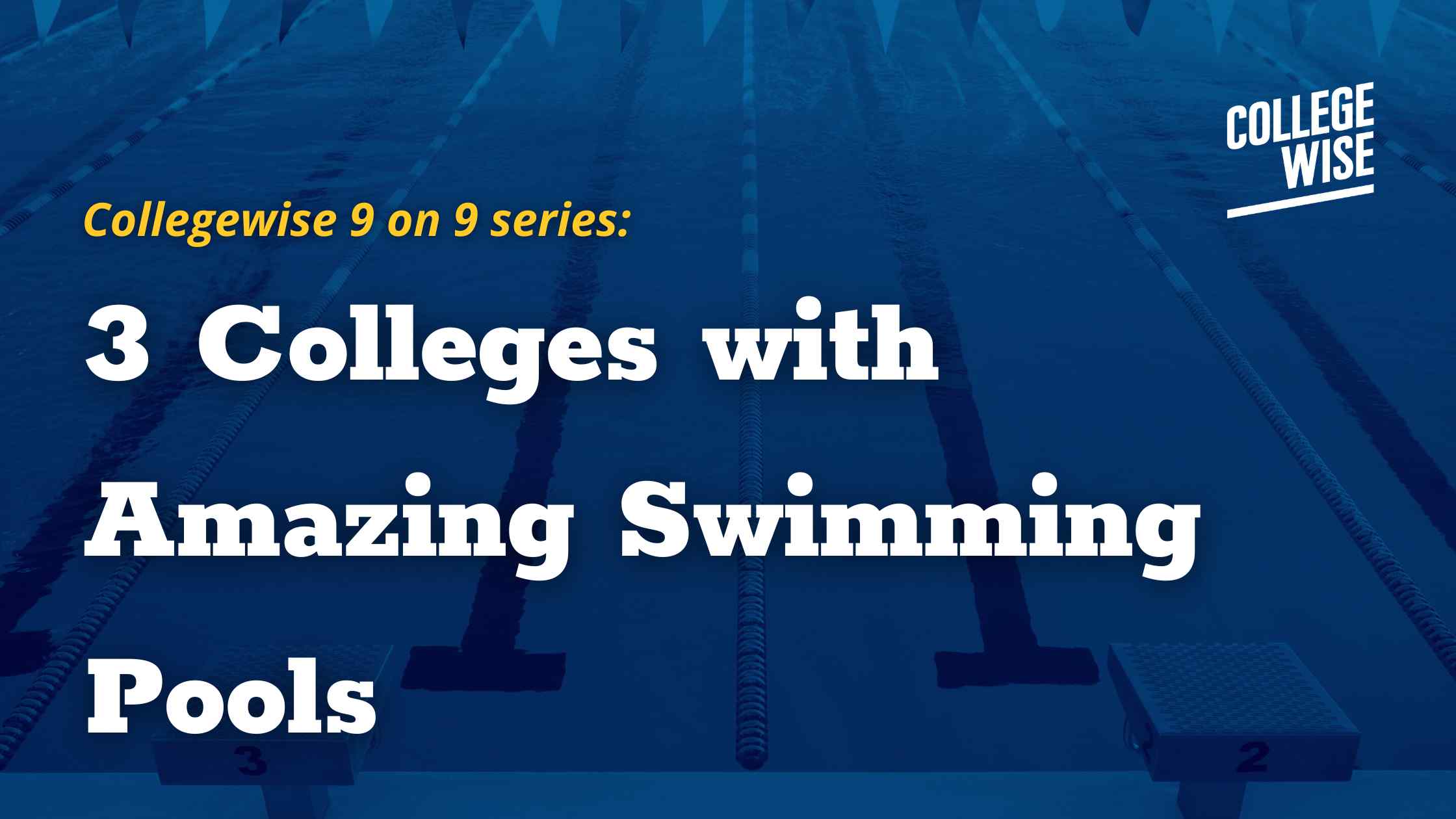
3 Colleges with Amazing Swimming Pools

3 Great Colleges for the Farmer in You
Subscribe to email updates.
- Tutoring & Test Prep
- Our Counselors
© 2024 Collegewise. All Rights Reserved. Privacy

- 720-279-7577

‹‹ BACK TO BLOG
College Timeline for Juniors
Mark montgomery.
- January 22, 2020

What is the proper college timeline for juniors? How should 11th graders prepare for college? When should they begin choosing the colleges that best fit them? What is the right college application timeline for juniors? These are all important questions in the college preparation, selection, and application process. This is our Great College Advice for juniors to help them stay on track throughout the most important year in the college admissions timeline.
The timeline is presented by season. One of the misconceptions of the college planning process is that everything happens according to a pre-0rdained, consistent timeline. While there are aspects to the process that are tied to specific dates, the fact is that no two students undertake and complete the process in exactly the same way.
Thus the Great College Advice timeline is organized in a way to help you stay on track without creating a feeling that you are somehow always late with every aspect of the process. Our role in this process is to empower you to manage the process in the way that is best for you. Everything you’ll find on this list is something you should consider to be part of the process. But frankly, with very few exceptions, you’ll also find that the items can be done in an order that suits you best.
So have confidence! Take control of the process! Use this document as a way to ensure that you get it all done–with time to spare. But don’t be a slave to this timeline. Adapt it to suit the individual that you are.
College Timeline for Juniors in the Fall and Winter
Make sure you’re in the right classes.
This year is your last real chance to impress with the classes you’re taking, so make it count! Work with your counselor to make sure you’re not taking on too much, but that you’re also challenging yourself. If you’re unsure whether to take a tough course because you’re worried about your GPA, have a look at our post here . Keep studying to make sure your grades stay up!
Continue your extracurricular interests
Colleges want students who are engaged and active. They want students who will animate their campuses and make them interesting places to work and play. Consider stepping into a leadership role. Find ways to expand and deepen your commitments to the areas in which you already excel. The more achievements you can rack up in the next year, the better. And remember, the quality of your commitments is much more important than the quantity. Colleges will be looking for your achievements first. Being a participant is great, but learning to lead and excel is better.
College Admission is NOT a Timeline
As you review this college admissions timeline, remember tha t college planning rarely evolves according to a strict timeline . Keeping up your grades is not exactly something you can schedule: it’s something you have to work on every day. Similarly, your record of extracurricular achievement depends on a lot of factors that are hard to slot into particular days of the week or months of the year. Even developing a test prep calendar can be difficult, and plans can change depending on how hard you prepare and the score you get on your first attempt.
So it can be misleading to think of the process of getting into college as a simple timeline that you follow from month to month. To learn how to take a wider view of the college preparation process, check out Mark’s free webinar on the secrets of college admission.
Make a testing plan
If you haven’t already, fall is the time to map our your testing plan. Take full-scale diagnostics on both the SAT and the ACT to understand which test suits you best. Many test prep companies, such as ArborBridge , will offer a free diagnostic and recommendation as to which test would be better for you. Armed with this evidence, you can plan how to prepare and choose dates that work best for you.
We strongly recommend that you schedule at least one “real” test in your junior year, and have another date as a “back up plan.” We generally recommend that you try to take your first test in the fall or winter of junior year, with spring as a fall back option if you need to retake. Senior year is going to be super busy, so don’t leave the testing until the last minute. Plan!
Take the PSAT in October
Even if you took it last year, this is the one that counts! The PSAT is used to qualify people for the National Merit Scholarship Competition . Even if you don’t think you’ll score high enough to qualify for the scholarship, the PSAT is a great way to acclimate yourself to the fun of taking standardized college entrance exams (just kidding!). You will sign up for the PSAT at your school, so look for announcements from your guidance office.
Prepare for the ACT and/or SAT
We generally recommend one-on-one tutoring for our students. While the per-hour cost is more, a really good tutor can help you raise your score, which not only increases your chances for admission but can really boost your chances of a merit scholarship. If private tutoring is impossible, try to attend an ACT/SAT class or workshop. Some high schools will even offer these workshops for free, so look for announcements from your guidance office. If you can’t, there are books and websites you can use. Strongly consider signing up for the ACT/SAT during the spring semester at the very latest. Follow these links to sign up for the SAT and the ACT .
Research possible college majors
Now is the time to really focus in on what you want your major to be. Identify your interests and look up online what careers and majors are associated with them. Some websites offer free tests that assess things you like and dislike and offer possible major choices, which could help you if you’re not sure where to start. Check out MyMajors.com as an example. You can also talk to your counselor about choices and to see if they offer a career test as well.
Make a college list
It’s time to start making a list of schools you want to apply to. Keep in mind that you should have safety, target, and reach schools on your list—don’t just apply to one Ivy League! Gather information on admission criteria and deadlines. Make sure the schools you’re interested in have the major you want to study. Consider things like size and location as well as academics. Will you be happy at a rural school, or do you want to be in the city? Do large lectures seem like the way to go, or would you rather have a school with small classes?
Attend more college fairs
Now that you have a list of schools you’re interested in, visit their booths at a college fair near you. Introduce yourself, talk to the admissions representative, and ask questions. Sign up for their email list. Your high school guidance office will likely be sending out information about these fairs. You might also consider a smaller, more targeted fair, such as the College That Change Lives fairs . Or check out the more specialized fairs for things like performing arts , studio art, or STEM.
Talk to your family
Let your family know which colleges interest you. Listen to their questions and concerns; they might be things that didn’t occur to you, or they might ask you questions things you can already answer. Now that will impress them that you’ve got this process under control! If, however, you’re feeling hounded by your parents about the college process, suggest to them that you make a set time every week to discuss college stuff. This way you keep the family discussion going, but you can avoid the constant nagging: “Hey, Mom, thanks for reminding me about this college stuff; let’s talk on Wednesday after dinner at our appointed time.” Sometimes creating boundaries are as important as creating a college admissions timeline.
College Timeline for Juniors in the Spring
Help out senior friends.
If you have friends who have started getting college acceptances, offer to help them with locating scholarship information. Not only is this a nice thing to do, it’s information that you’ll be able to use yourself next year—without having to look it up again.
Schedule college visits
Try to do as many visits as you can while the campus is holding classes. Spring break could be an ideal time for these visits. You’ll get a much better idea of what it’s really like there during classes than you will while the school is on break. Take a campus tour, go to an information session, and see if you can meet with an admissions officer or a faculty member in your intended major. Make sure you go prepared with questions to ask! Keep in mind that some schools offer admissions fee waivers when you visit, so it doesn’t hurt to ask.
Download this comprehensive e-book to learn how to get the most from your campus visits.
Demonstrate your interest
Colleges want to know that you are interested in them. College visits are one sure-fire way to demonstrate that interest. However, if you’re unable to visit for any reason, you should still let the admissions office know that you are seriously considering their college. Fill out the form on their admissions website to request more information. Write a short note to an admissions officer asking for specific information about a program or major that interests you.
Follow the school’s account on Instagram, Facebook, Twitter, and other social media (believe me…this sounds crazy, but it helps). Think of each of these contacts as a “brownie point” in the admissions process. And who doesn’t need more brownie points?
The the ACT and/or the SAT
Even if you plan to take these tests during your senior year, it can be helpful to take them now, too. Make sure you sign up by the deadline and arrive with all required materials and nothing else.
Ask for letters of recommendation
Many schools will require you to have letters of recommendation from teachers or guidance counselors. Ask those individuals towards the end of your junior year, when they’ve just had you in class or in the office. This way, they’ll remember you better, and will be able to write a compelling letter telling everyone how wonderful you are. If you wait, you might get a more generic letter, which won’t help as much in the admissions process. To learn how you can get great letters of recommendation, check out this article . Recommendations are an important aspect of your college admissions timeline.
College Timeline For Juniors in the Summer
Decide who you will apply to each school on your list.
Early action? Early decision? Regular decision? Figure out which admission programs you’re going to apply under for each school. We generally recommend that you apply early for as many schools as possible. Make sure to check and see if there are any special early deadlines for scholarships or for certain programs. Mark the dates on your calendar, and make sure to give yourself enough time to complete all of your applications.
Work on application essays
Most applications release their essay prompts well in advance of when the application actually opens. The Common Application usually releases topics in March. Starting your essays well before they’re due gives you the chance to put a lot of thought into them, which will help your essay stand out more.
The hardest part of the entire essay process is landing on a topic that will make you shine. It also gives you plenty of time to edit so your essay is perfect. Also note that many colleges require additional, or supplemental, essays as part of their applications. You will need to look these up and create a document that contains all the prompts you will have to address on your various applications.
College Admissions Timeline for Junior Parents
Visit nearby schools.
Arrange a day trip to a few nearby colleges. They don’t have to be ones that your student is interested in; check out a big school vs. a small school or a public university vs. a liberal arts college. Visit places with differences so you can start a conversation about what your student is really looking for in a school.
Help your student narrow down the college list
Ask your student to explain why each school is on their list. Help them think of pros and cons for each school so they can really narrow it down. (This will help later, too, when they have to write a supplemental essay on the topic, “Why do you want to go to this school?”). Attend college fairs with your student, if possible, and help arrange college visits for you and your student.
Ask about scholarships
Make sure your student is looking into potential scholarship opportunities. Ask at work if they have a scholarship program for employees’ children. Find out about local scholarships for which your student can apply.
The college planning timeline summary
So there you have it–a college planning timeline for juniors. This to-do list contains the things you need to stay on track and take control of the college planning process. However, if you feel as though you need some personal guidance in through this process so that you can blaze your trail toward college success, give us a call (after all, it’s much more than a college admissions timeline).
Send us an email. Or sign up for a free 20-minute consultation to find out whether personally, tailored college admissions advice can help you make the process of preparing, selecting, and applying to college more successful, less stressful, and more fun.
Archive by Date
Recent posts.
- Navigating the U.S. College Application Process as an International Student in 2024
- Class Size & Student to Faculty Ratios: What Research Says?
- How Long Should a College Admissions Essay Be?
- The Perfect College Essay: Focus On You
- The Perfect College Essay: Tell a Good Story

Join our Facebook Group ›› Stay informed about college admissions trends and ask questions of experts who can give you Great College Advice.


College Visits Essentials: Making the Most of Your Campus Tours
College Visits Essentials
Embarking on college visits and campus tours marks a significant milestone in the college search process. These experiences offer invaluable opportunities for prospective students to explore potential colleges firsthand, gaining insights into campus life, academics, and extracurricular opportunities. As you begin compiling your college list and narrowing down your choices, college visits can help you make informed decisions about your future.
In this article, we’ll delve into the essentials of college visits, offering practical college visit tips and a college visits checklist for maximizing your experience . We will cover everything from uncovering the questions you should ask during a college tour to understanding how to schedule and plan college visits effectively. And, we’ll look at things you may not have thought about, including having virtual college visits, conducting a self-guided tour, and navigating college campus tours safely and effectively.
We promise this article provides everything you need to know regarding the college visit process. Whether you’re just beginning your college search or fine-tuning your college list, these insights will help you navigate the complexities of the college visit process with confidence.
Let’s get started!
Are College Visits Important?

When making one of the most significant decisions of your academic career, the role of college visits in the college search process cannot be overstated. College campus tours are a crucial part of the decision-making process, offering firsthand insights that can influence your college search.
First and foremost, college visits allow you to immerse yourself in the campus environment and explore academic facilities, dormitories, and recreational amenities. Whether you’re passionate about conducting research in state-of-the-art laboratories or participating in vibrant student organizations, visiting a college in person lets you assess whether it offers the resources and opportunities you seek.
Moreover, college visits offer the chance to interact with current students, faculty members, and admissions staff, providing invaluable perspectives on academics, extracurricular activities, and campus life. These personal connections offer unique insights you simply can’t gain from a website or brochure.
Ultimately, the information and impressions gathered during college visits can significantly impact your college choice. By experiencing campuses firsthand, you can effectively consolidate your college list and compare your top colleges by understanding which colleges resonate with you. Before you make your final decision , you can use the information collected on the campus tours to demonstrate your interest in the college or university, increasing your chances of acceptance.
What Should I Ask On A College Tour?

While college visits and campus tours provide invaluable firsthand experiences , it’s essential to do your homework before stepping foot on any campus. Here’s one of our “pre” college visit tips–conduct thorough research beforehand to help you make the most of your visit. By asking the right questions , you can gather the information you need to make an informed decision about your college choice.

Questions about academics
One crucial aspect of pre-tour research is identifying academic programs and resources that interest you. Take the time to explore the college’s website and familiarize yourself with the range of majors, minors, and academic opportunities available. Here are a couple of questions you may want to ask:
- Can you provide more information about the [specific major/program]?
- Are there opportunities for undergraduate research or internships in [area of interest]?
Questions about campus life
In addition to academic offerings, consider campus life and student services that you would like to know more about. Research the college’s extracurricular activities, student organizations, and campus events to understand the social and cultural opportunities available. Here are other questions you may want to ask:
- What types of student organizations are active on campus?
- Are there opportunities for community service or volunteer work?
More college visit questions
Furthermore, consider other aspects of the school that might not be immediately obvious. Research housing options for juniors, including on-campus dormitories, off-campus apartments, and housing policies for upperclassmen. Also, consider things like parking availability and policies regarding cars on campus. Consider asking questions such as:
- What are the housing options for upperclassmen, and how is housing assigned?
- Is parking available on campus for students, and are there any restrictions on bringing cars?
Conducting thorough research, and making your college visits checklist, is essential for making the most of any college visit.
How Many College Visits Should I Do?
When determining how many college visits you should do, you’ll need to strike a balance between quantity, quality, and expense. While visiting as many colleges as possible may seem ideal, college visits can get pricey. Therefore, it’s crucial to personalize your college visit plan to ensure that you make the most of your time, energy, and financial resources.
Here are some steps you can take to help prioritize your college visits and ensure you are completing the right number of college campus tours:
Four Steps to Planning College Visits
1. start with a broad college list.
Have a wide range of colleges that interest you, encompassing various types of campuses such as big versus small, urban versus rural, and public versus private institutions. Consider including HBCU college tours or schedule one or two Harvard tours. Having a broad college list lets you gain insights into the diverse campus environments and refine your preferences accordingly.
2. Prioritize your top choices
Once you’ve identified your top 3-5 colleges on your college list, prioritize visiting these campuses. Consider planning multiple trips in various capacities if you’re highly interested in a particular school. For example, you can schedule an online UCLA campus tour. Then, schedule an in-person prospective student UCLA campus tour. You can even conduct a self-guided tour versus an official UCLA campus tour to have more flexibility in where you’ll get to go on campus.
3. Balance depth with practicality
While visiting as many colleges as possible can be beneficial, consider the practicalities of your college visits checklist. Virtual college tours and information sessions can be valuable alternatives for colleges that are harder to visit in person. For instance, Harvard tours can be in-person or virtual. Therefore, if Harvard is on your list, plan your Harvard tours accordingly based on your availability and resources.
4. Consider special programs
If you’re invited to special programs for admitted students or specific academic departments, prioritize these college visits. Special programs through HBCU college tours or college visits for juniors often offer opportunities to interact with faculty, current students, and other admitted students, giving you a firsthand glimpse into life on campus.
Next, let’s discuss how to plan and schedule a college visit.
How To Schedule College Visits
Planning your college visits involves careful coordination and scheduling to ensure you make the most of your time on campus. From considering academic calendars to contacting college admissions offices, here are some college visit tips regarding scheduling your campus tours effectively.
Here are two of the most important things to keep in mind when working on the logistics of your campus visits.
How to Work on Logistics of Campus Visits

Consider Academic Calendars
Plan your college visits around academic calendars. Before scheduling your college visits, consider the academic calendars of the colleges you plan to visit. Check their websites to determine the dates of important events, such as orientation sessions, midterm exams, and holidays. This is important whether you are planning college visits for juniors, HBCU college tours, or any other kind of college visit.
Contact Admissions Offices
Contact college admissions for tour scheduling. Once you’ve identified potential college visit dates, it’s time to contact the admissions offices or go to the admissions website to schedule your campus tours. Most colleges offer guided campus tours led by student ambassadors or admissions staff. Additionally, many schools host information sessions that provide an overview of the college’s programs, resources, and admissions process.
Scheduling college visits: step-by-step
Let’s take a look at a hypothetical example to better understand the steps it takes to schedule a campus tour. Imagine you’re a high school student living in Chicago. You have already completed a University of Chicago tour, and now, you’re interested in scheduling a tour of the University of Southern California (USC) in Los Angeles. As an in-state college, accessing the University of Chicago tour may have been simple. But let’s look at how you can navigate the scheduling process of an out-of-state college tour:
Navigating an Out-of-State College Tour
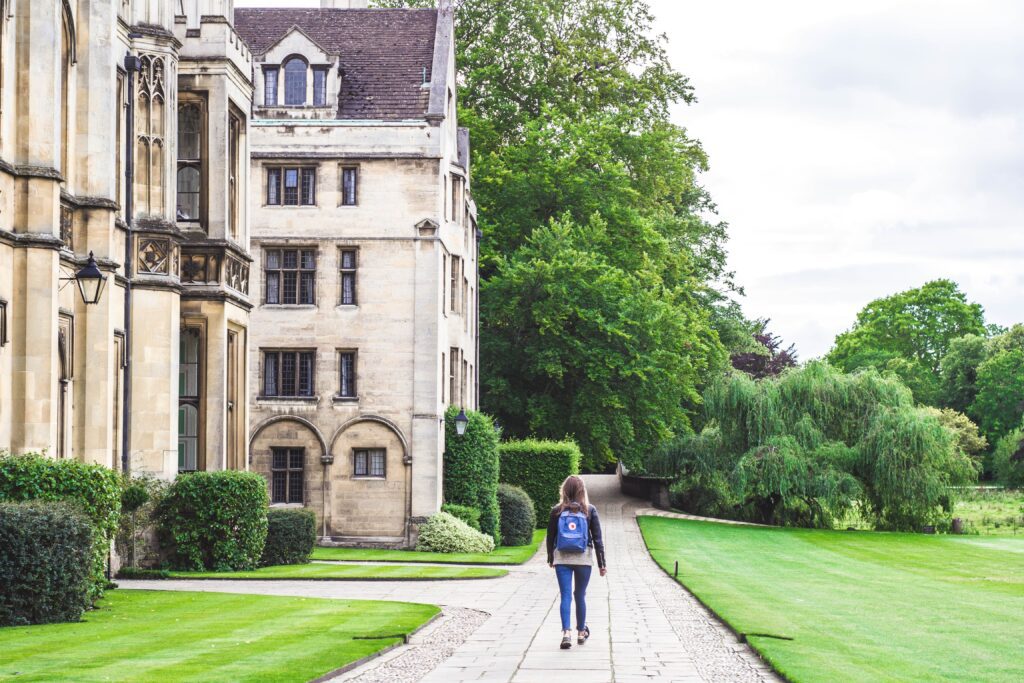
- Research USC’s academic calendar to identify optimal visit dates that align with your availability.
- Visit USC’s admissions website to find information about campus tours and information sessions. Determine whether USC offers guided tours, self-guided tours, or virtual college visits for prospective students unable to visit in person.
- Use the USC campus tours website to schedule your campus tour. In addition to scheduling an admissions tour and presentation, consider scheduling an academic department presentation.
- Upon confirmation of your campus tour reservation from USC’s admissions office, make travel arrangements from Chicago to Los Angeles. This includes booking flights, accommodations, and transportation to and from the USC campus.
- Plan your itinerary for your visit to USC. Consider attending guided campus tours, participating in information sessions, exploring campus facilities, and engaging with current students and faculty members.
- During your visit, bring your college visits checklist. Take notes, ask questions, and gather information to help you decide whether USC is the right fit for you.
Since the cost of college visits is a big factor to take into consideration during the planning process, let’s discuss it further.
Are College Visits Free?

As you begin to make your college visit list, you’ll need to understand the costs associated with college visits. While some campus tours may be free, others require careful budgeting and planning to manage expenses.
College visits can incur various expenses, including transportation, accommodation, meals, and miscellaneous fees. While some colleges offer free guided campus tours and information sessions, others may charge a nominal fee for certain services or events.
Tips for managing the cost of college visits
To manage the costs associated with college tours effectively, consider the following college visit tips for budgeting and finding free visit opportunities:
Start planning your campus tours well in advance to take advantage of early booking discounts and special promotions. Research travel options, accommodations, and local amenities to identify cost-saving opportunities and plan your itinerary accordingly.
Utilize virtual college tours
Besides visiting colleges in person, explore virtual college tours offered by colleges and universities. Many institutions, such as Boston College and Harvard University , provide virtual college visits and information sessions that allow you to explore campus facilities, interact with admissions staff, and learn about academic programs from the comfort of your home at no cost.
Explore fly-in programs
Several colleges and universities offer fly-in programs. These programs typically cover travel expenses, accommodations, meals, and participation in campus activities, allowing students to experience campus life firsthand without incurring any costs.
Speaking of fly-in programs, let’s learn a little more about them.
Fly-in programs
Here are three great fly-in programs/opportunities for low-income students.
1. QuestBridge College Prep Scholars Program
College visits for juniors are incredibly important. QuestBridge offers a College Prep Scholars Program for high-achieving, low-income high school juniors which, you guessed it, sponsors college visits for juniors. This program provides participants access to college admissions resources, mentorship opportunities, and fly-in college visits for juniors to top colleges and universities across the United States. Beyond giving fly-in college visits for juniors, QuestBridge takes it a step further and will help fund your attendance to top summer programs at some of the most prestigious colleges in the country.
2. Tulane University, PreviewTU Program
PreviewTU is a campus visit program at Tulane University that typically occurs in the fall. While open to all, students who identify as first-generation college attendees, LGBTQIA+, are from low-income backgrounds or rural/small-town residents, and/or students of color are particularly encouraged to attend. The program is offered both virtually and in person. PTU activities include campus tours, student panels, admissions and financial aid sessions, lunch with Diversity Fellows, and opportunities to connect with professors and support partners. Financially disadvantaged students may qualify for partial travel reimbursement stipends of up to $500 for themselves and one guest.
3. Massachusetts Institute of Technology, Weekend Immersion in Science and Engineering (WISE)
MIT’s Weekend Immersion in Science and Engineering (WISE) is a three-day program for rising seniors to explore MIT life. It’s fully funded, covering transportation to and from MIT. Applicants from underrepresented backgrounds, including Black, Latinx, and Native American students, those from lower socioeconomic statuses, and first-generation students, are strongly encouraged to apply. WISE typically occurs in September. Participants reside on campus with MIT undergraduates, engaging in academic and campus life activities. They meet peers and faculty and attend college admissions and financial aid workshops. Applications are due in August, and the program generally takes place in October.
At this point, we’ve covered college visit tips for preparing for your visit. Now, let’s discuss what to do when you’ve finally made it to campus!
Things To Do On A College Visit
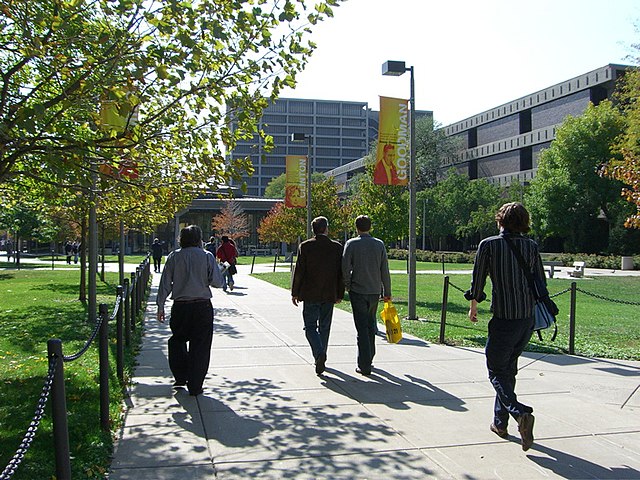
As shared earlier, college visits offer students a chance to get a feel for the college campus and community. Therefore, while on a college visit, it’s important to take advantage of all the things to do on campus and within the surrounding community or area. Here are 3 things to do on your college tours and college visits:
3 Things To Do on College Visits
1. attend information sessions and campus tours.
This may seem obvious but don’t bail on the planned tours and sessions. They’ll give you valuable information about the school and campus. These parts of the college visit are just as important as exploring on your own. Don’t forget to bring your list of questions and ask about anything that isn’t answered!
2. Inquire about attending classes or talking to current students
Besides attending information sessions and campus tours, ask about the possibility of attending classes or speaking with current students during your visit. Observing a class in your area of interest can provide valuable insights into the college’s academic rigor and teaching style. Similarly, chatting with current students can offer firsthand perspectives on the overall student experience.
3. Explore the campus
Don’t be shy when you’re visiting a college’s campus. Wander around and imagine yourself living or studying there. Check out all the different areas of campus. Basically, get a feel for the vibe of the school–trust your intuition and see if it feels like a fit.
Don’t forget to consider the area outside of campus. Evaluating the surrounding community of a college campus can provide valuable insights into the overall quality of life and opportunities available to students during their college experience. Think about the amenities and resources that are important to you. Consider adding these questions to your college visits checklist. Are there nearby music venues, art galleries, or cultural attractions that align with your interests? What transportation options are available, including airports or public transit systems? No detail is too small to ask about on your visit to campus.
When Should You Start Visiting Colleges?
Navigating the college search process is undoubtedly complex. Next, we will cover some tips on when to set up your first college visit. There isn’t a hard and fast rule to this question, but there are certainly some best practices when it comes to planning college visits.
It is never too early to begin visiting colleges. College admissions offices receive tour requests from students as young as 6 th grade. If you plan to visit a college any time before your 9th-grade year, it is important to remember that you may need to tour the college again before applying and certainly before enrolling.
Going on a college visit as a younger student can begin planting the seeds for what college is like. But very rarely will a college visit before high school provide you with meaningful admissions information that you will be able to retain and act on when it is time to submit your application.
College visits for juniors and seniors
As you get closer to your junior and senior year of high school, college visits become more than just an opportunity to understand college more broadly. College visits for juniors and seniors can help students discover their preferences. At this stage of the college search process, students can begin to discern the type of college campus they might see themselves ultimately enrolling at.
Whether you are on a UCLA campus tour in California, a University of Chicago tour in Illinois, or a Harvard tour in Massachusetts , you can begin to explore your regional preferences. Additionally, experiences on HBCU college tours can give you some insight into distinct institutional types. Note how you felt about your HBCU college tours at institutions like Spelman College or Howard University compared to other universities. College visits do more than show you what colleges you might like, they also expose you to colleges that might not be a good fit.
Managing the logistics of college visits
Campus visits are often hard to arrange because of the time and resources they require. If you are planning to go on multiple college campus tours, you may find a strain on time and resources. A student who lives in Florida may find that attending a UCLA campus tour is much harder to plan than attending a campus tour at the University of Florida. Because of this, many families begin planning their campus visits far in advance. There are also opportunities to visit campus at the last minute. However, these trips typically align with other travel or are at campuses close to the student’s home.
In addition to prospective student visits, you may have the opportunity to visit campus as an admitted student. Admitted student college visits often include a more immersive experience than a college campus tour for a prospective student. Even if you have already visited campus, admitted student visits will often equip you with all the information necessary to make your final college decision .
College Visits During Coronavirus

The coronavirus pandemic resulted in additional access to college admissions information. During the pandemic, colleges and universities added an increased number of virtual college tours, online information sessions, and other virtual opportunities to learn more about colleges in the absence of in-person college campus tours. Virtual college tours allow students to access information at any time and refer to these virtual college tours when questions arise.
The pandemic also resulted in additional safety measures for college campus tours. At the height of the coronavirus pandemic, college campus tours were completely halted. As campus tours resumed, colleges adopted mask mandates, reduced tour capacity, and made changes to tour stops. The largest safety measure during the coronavirus pandemic was COVID-19 testing prior to attending college campus tours.
While many of these safety precautions are a thing of the past, it is important to understand the heightened awareness around health that is still present on college campuses. Before you visit a college campus, it can be helpful to review their policies to confirm that there are no additional requirements for their campus tours. And, don’t be afraid to take personal precautions to take care of yourself, like wearing a mask on your visits.
What Colleges Are Open For Tours?
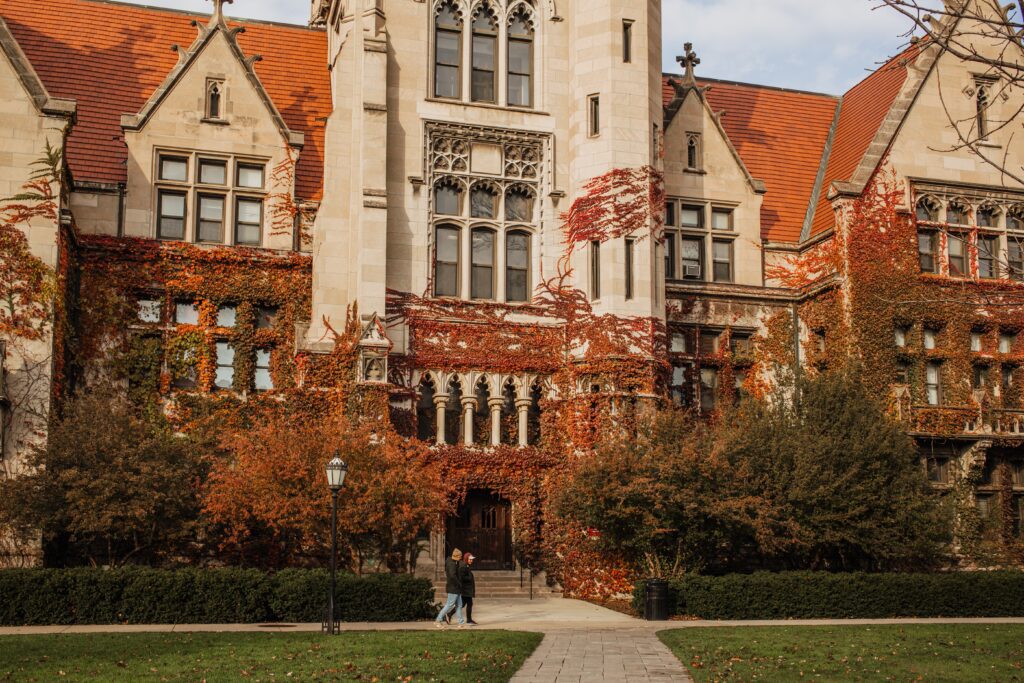
Thousands of colleges and universities across the country offer college tours . Most colleges offer campus tours throughout the academic year and in the summer. To learn more about the campus tour availability on a specific campus, you should visit the admissions or welcome center website. Some colleges also provide the opportunity for a self-guided tour which allows families to visit campus outside of the scheduled tour times.
Virtual college visits
If you are unable to arrange an in-person college visit, don’t fret. There are several ways to experience a college without stepping foot on campus. Virtual college tours and virtual college visits allow students to experience a campus from the comfort of their homes. For example, if you are unable to attend the UCLA campus tour or the University of Chicago tour, you can sign up for one of their virtual college visits or virtual college tours.
In addition to virtual college tours and virtual college visits, social media has also offered opportunities for prospective students to explore a college campus from their cell phones. Following institutions on your college list on Instagram or TikTok can often provide a current student’s vantage point of their campus. Social media is one of the best ways to get to know a college virtually!
What Happens During A College Visit?
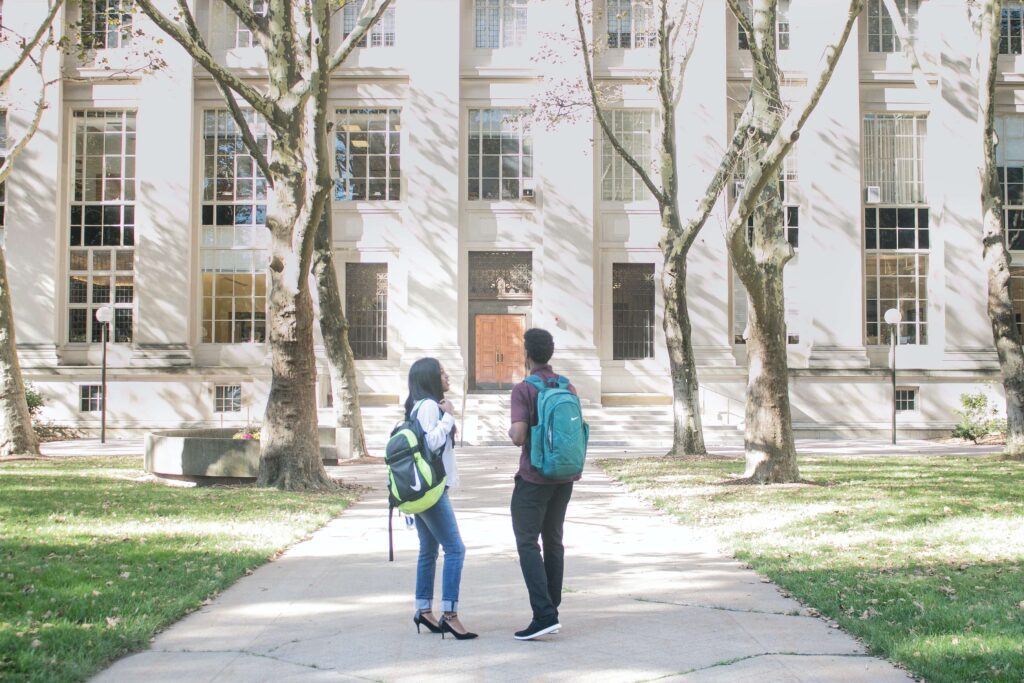
College visits come in all shapes and sizes. Most college visits include some type of campus tour. Campus tours can be led by a student ambassador or experienced as a self-guided tour. The first stop on college campus tours is typically the Office of Admissions or the Welcome Center. This introduction to campus usually provides basic information on the college and orients the guests with the rest of the tour.
Academics
College campus tours introduce students to the academic buildings, student life opportunities, and residence life offered on the campus. Academic buildings on campus tours can include the school library, tutoring center, or architecture building. Understanding where your major classes are located can give you insight into the classroom and lab spaces available to students in your major.
College campus tours can also be enhanced by exploring additional personalized experiences. Some colleges will offer a general admissions information session as part of the campus tour. Other institutions might offer academic information sessions for students interested in majors like engineering, computer science, or business.
Student/residence life
Student life opportunities can be found throughout the campus tour and are an important deciding factor in the college search process. College visits highlight the student organizations available for you to join. You may also find your tour guide pointing out popular hangout spots around campus. Student guides on Harvard tours might point out the Stone Hall Basement or Squash courts in the athletic complex. Student life opportunities also include campus events and traditions. Student guides on HBCU tours might talk about their epic homecoming celebrations.
Residence life also tops the list of the most popular campus tour stops. Residence life information includes touring a dorm and seeing the cafeteria. Facilities such as the campus gym and study spaces might also be included in the residence life portion of the tour.
What To Wear To A College Visit?
When you schedule your first college visit, it is unlikely that your email confirmation will include a dress code. The type of clothing you choose to wear may vary based on the type of college visit you are going on. As a rule of thumb, you should wear clothing that you feel confident in–and that you’d feel comfortable meeting admissions officers in. Considering the weather and walking requirements will also provide insight on what to wear.
Beyond what to wear, let’s discuss what additional items should be included on your college visits checklist.
What To Bring On A College Visit?

College visits can often be long days in cities you are unfamiliar with. So, it is critical to think about the items you might need during the day. Check out this college visits checklist:
College Visits Checklist
- Notepad and pen
- Umbrella or poncho for inclement weather
- Phone to take pictures and videos
- Money to visit the school bookstore
All the items on the college visits checklist may not be necessary for every college visit. You should use your best judgment to discover if these items would be useful for the campus you are visiting.
College campus tours can be impacted by several variables. Campus visits are subject to weather, campus emergencies, holidays, and many other contingencies. Your college visits checklist may shift depending on any of the events above. Check out this resource as you are compiling your checklist.
5 Tips for Maximizing Your College Visits

Throughout this guide, we’ve discussed the importance of college visits, when to begin planning college visits, and what to include on your college visits checklist. Before we wrap up, let’s discuss five college visit tips for maximizing your time.
5 Tips for College Visits
1. do your research.
Studying a college ahead of time allows you to better understand its programs, campus culture, and the opportunities it offers. Identify specific areas of interest, such as academic departments, extracurricular activities, or campus facilities you want to explore. Having a basic knowledge of the campus and how it aligns with your interests will allow you to focus on the more nuanced questions and observations once you arrive for your campus tour.
2. Engage with the Campus Community
Talking to campus community members apart from your tour guide is one of the best ways to have an authentic experience during college visits. Campus community members include current students, faculty, and staff. Conversations with people who are on campus every day will give you firsthand insights into the college experience there. And, you don’t have to worry about whether someone is just telling you something because it is their job to do so (tour guides are great, but they are extensively trained to share specific information). Ask questions about academic programs, student life, support services, and anything else that will help you gauge if the campus is the right fit for you.
3. Attend Information Sessions and Campus Tours
Some students might think that arranging an unofficial tour will be more beneficial and honest. While you may receive some inside information that an official tour won’t provide, you will also miss out on some critical information. Always register for the official campus tours and information sessions to gain structured insights about the college. These sessions often provide valuable information not available on the website or in brochures. Meeting a current student or family friend for lunch or taking a self-guided tour after an official information session can give you the additional freedom you are seeking out on your college visits.
4. Explore Beyond the Tour
After your official tour, it is highly recommended to explore campus on your college visits. Spend time wandering around the campus to get a feel for the environment and the student body. It is of growing importance to students that they like the town or city that their college is in. Visit the surrounding area of the campus to see what amenities and off-campus activities are available to students. If you are unfamiliar with the city, you might benefit from visiting some tourist attractions like museums, parks, or special events. Another great way to explore the environment around campus is going out for a simple lunch or dinner to get a better feel for the culture beyond the college campus.
5. Document Your Visit
After going on several college visits, they may begin to all run together. Be sure to take notes and photos during your visit to help you remember what you liked and disliked about each campus. This is especially important for college visits for juniors and sophomores, as these students may have more time between their college visits and submitting the admissions application. Once your tour is over, reflect on each of your visits to compare the different colleges. You will need this perspective once you begin receiving admissions offers and are facing a finite time to make such an important life decision. After all, one or two details may be the difference between a college making your college list.
College Visits – Takeaways

College visits are an essential part of the college search process and creating a college list. Thankfully, planning an informative college visit is not as complicated as you might think.
Successful college campus tours begin with doing your research early. This research might include location, academic offerings, and student life opportunities. Whether you are attending HBCU college tours, Harvard tours, or Boston College tours, feel free to look back at our college visit tips.
During your college visits, do not forget to register for an official tour , engage with the campus community, and explore the environment beyond the campus tour. Your college campus tours will be beneficial far after the visit has ended. Read through your notes and look through pictures of the campus when it’s time to fill out your college applications. We hope by the end of this guide, you feel prepared to plan and go on your college visits. For more resources, check out this college visit webinar on making the most of your visit and how college visits show demonstrated interest . And, after all those college visit tips, here’s one more for the road–have fun!

This article was written by senior advisor, Ashley Hollins and Chelsea Holley. Looking for more admissions support? Click here to schedule a free meeting with one of our Admissions Specialists. During your meeting, our team will discuss your profile and help you find targeted ways to increase your admissions odds at top schools. We’ll also answer any questions and discuss how CollegeAdvisor.com can support you in the college application process.
Personalized and effective college advising for high school students.
- Advisor Application
- Popular Colleges
- Privacy Policy and Cookie Notice
- Student Login
- California Privacy Notice
- Terms and Conditions
- Your Privacy Choices
By using the College Advisor site and/or working with College Advisor, you agree to our updated Terms and Conditions and Privacy Policy , including an arbitration clause that covers any disputes relating to our policies and your use of our products and services.

Junior Year in High School: Your Go-to College Planning Roadmap
Find your degree.

It’s your junior year of high school. This is the crossroads where future paths start taking shape—where college planning kicks into high gear. If you’re thinking about your future and what you need to do to get ready for college, we’re here to help. Think of this post as your personal map to help guide you through the maze of college planning in your junior year of high school .
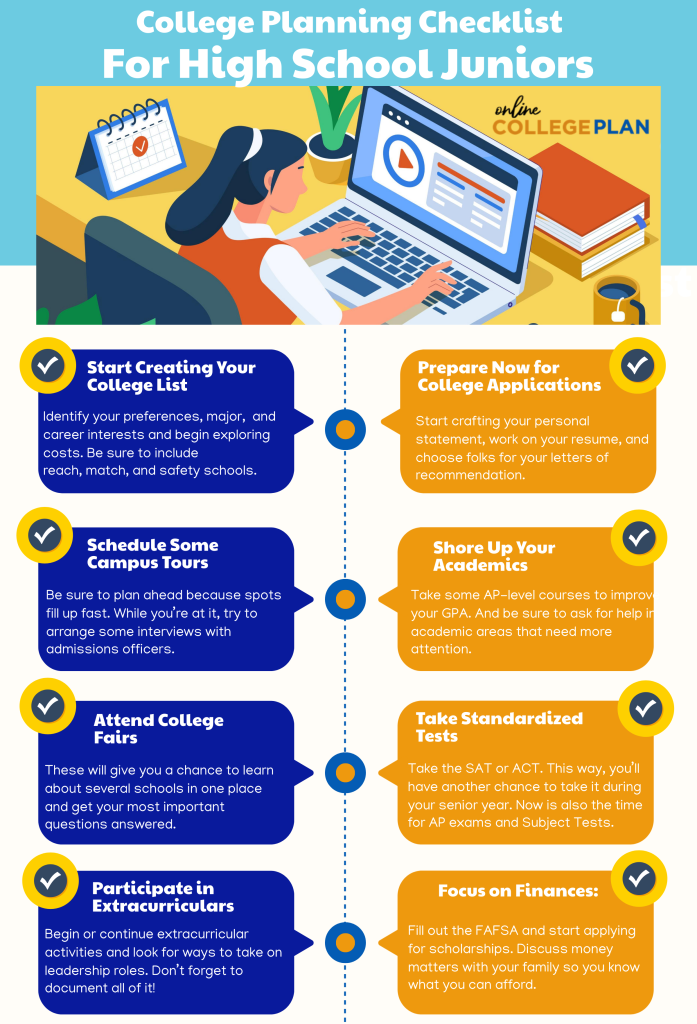
Table of Contents
First Things First: Crafting Your College List
If you haven’t already, it’s time to create a college list. You want to identify reach, match, and safety schools. What does that mean? Think of it like aiming for a trio of baskets – “reach” schools are like shooting a three-pointer. They aren’t impossible, but they will need some serious game. Then there are the “match” schools, where you can lay up comfortably because they fit your stats pretty well. Lastly, you have “safety” schools; these are your free throws, where getting in is almost a sure shot.

Identify Your College Preferences
When you picture yourself going to college, what does it look like? Do you envision a big city campus with lots of bustle and activity? Or do you see yourself at a small college surrounded by nature? Location, size, and environment all come into play. Even if you plan to attend college online, you’ll still want to consider factors like campus culture, student services, and the overall vibe. Check out each college’s website, social media pages, and student reviews to get a better feel for things.
Consider Your Major and Career Interests
Another high-priority factor to consider when putting your college list together is your major. You’ll want to look for schools with programs that closely match your career goals and interests. Scope the curriculum and content of each program. For example, some schools offer internships and study-abroad programs. If hands-on learning is your vibe, such perks might interest you.
Start Exploring Costs
You wouldn’t buy something without checking its price tag first, would you? The same goes for picking colleges. Luckily, most have net price calculators online that predict roughly how much each will cost after factoring in potential aid packages. You can check these out before you even apply. We’ll talk more about money later on.
Key Takeaway: When you’re whipping up your list of colleges, mix in some dream schools, ones that feel just right, and some easy-peasy options. Also, consider the location, environment, and overall culture of the schools you’re eyeing. Finally, be sure they offer programs that match with what you’re into, and figure out how much cash you’ll need to shell out. That way, your college search is gonna be on point.
Diving Into Campus Visits
Visiting college campuses is something you can do at any point in your high school journey. But if you haven’t done it by Junior Year, it’s time to get a move on. Spending time on campus will give you the inside scoop on where you might be spending the next few years! Here are some tips for planning college visits:

Schedule Campus Tours
Most schools offer campus tours that can be scheduled online or by phone. You’ll want to schedule them early because spots fill up fast during busy times. Pick a date and time that works best for you (and your parents). And if you’re considering several colleges in one area, why not pack them into one epic day?
Interview with Admissions Officers
Some colleges will let you interview with an admissions officer during your visit. This is a great way to demonstrate your interest in the school and learn more about the admissions process. You’ll want to prepare for the interview by researching the school beforehand. And don’t forget to dress for success and arrive on time!
Attend College Fairs
College fairs are another great way to learn about potential choices. They’re kind of like buffets but for schools – lots of options all in one spot. You’ll find reps from various colleges with insider information about admissions requirements, campus life, and degree programs. So be sure to come prepared with a list of questions and a notebook. It’s also a good idea to bring copies of their high school transcript and test scores to share with admissions representatives.
Staying Organized and Meeting Deadlines
Juggling lots of stuff can be tough, so it’s key for students to manage their time well. This means carving out specific time for college planning, like checking out colleges, prepping for tests, and getting those applications done. It’s also helpful to figure out what’s most important and break it down into smaller steps to stop you from feeling swamped.

Understand Early Action vs. Early Decision
You may also want to consider applying early decision or early action if the college offers these options. Early decision means you’re committed to going to that college if you get in. Early action is more flexible and lets you hear back from the college sooner, so you know where you stand.
Keep Track of College Admission Timelines
Knowing the deadlines for the colleges you’re interested in is crucial. This means keeping track of when applications are due, when you’ll find out if you got in, and when you need to sort out financial aid.
Helpful Tip: The easiest way to stay on top of college application deadlines is to make a calendar or spreadsheet with all the deadlines for the colleges you like. You can also use online tools and apps to help you stay organized and make sure you don’t miss any important dates. And don’t forget to set up reminders on your phone or computer to keep you in the loop about upcoming deadlines.
Extracurricular Involvement and Leadership
High school junior year is a fabulous time to explore your passions outside the classroom. Extracurricular activities are a great way to do this. Pick things you enjoy and that line up with your interests. It could be joining a club, getting in on a sport, or volunteering. Volunteering in high school provides you with valuable opportunities to develop important skills and gain real-world experience. Just make sure it’s something that really matters to you and that you can stick with for a while.

Look for Leadership Opportunities
Getting involved in extracurricular activities can help you build up your leadership skills, too. Look for chances to step up and take on leadership roles in the stuff you’re into. Whether it’s being a club officer, team captain, or volunteer coordinator, honing those leadership skills can make you stand out when it comes to college (and scholarship) applications.
Document Achievements and Awards
If you get involved in extracurricular activities, keeping track of your wins and triumphs along the way is key. That means jotting down your volunteer hours, keeping tabs on how your team is doing, and noting down any leadership gigs you take on. This info can come in handy when you’re filling out college applications and putting together your resume to show off what you’ve achieved and how dedicated you are to your activities.
Preparing for College Applications
Junior year of high school is a big deal when it comes to getting ready for college applications. Here are some tips to help you get going:

Craft a Personal Statement
Your personal statement is a significant part of your college application. Start brainstorming ideas and writing drafts during junior year. It should show off your personality, interests, and goals, and be well-written and interesting. Get a teacher or counselor to give it a once-over to make sure it’s top-notch.
Gather Letters of Recommendation
Most colleges want letters of recommendation from teachers or other adults who know you well. Start thinking about who you want to ask during junior year. Pick someone who knows you inside out and can talk about your strengths and achievements.
Create a Resume or Activity List
College apps often need a list of your extracurricular activities, volunteer work, and other wins. Start putting this together during junior year. Include all the important stuff and give the deets about each one. You might also want to put together a resume to show off your achievements in a professional and organized way.
Academic Planning for Juniors
Junior year is imperative for planning your academic courses. That’s because it’s the last full year of academics that colleges will see when they review your application.

Select Your Courses
You may want to consider taking some challenging classes this year. Pick those that match up with what you’re into and what you want to do in the future. It’s a good idea to chat with your guidance counselor to ensure you’re on track to graduate and are taking the right college courses.
Manage Your GPA
Maintaining a solid GPA is vital for getting into college and snagging scholarships. So, be sure to put forth your best effort to get good grades. It’s also a good idea to take AP courses or dual enrollment classes to push yourself academically. This can help bump up your GPA and demonstrate you’re ready for college-level work.
Use Tutoring and Support Resources
If you’re having a tough time with your schoolwork, looking for extra help is a good idea. Most high schools have tutoring programs, study groups, and academic counseling to give students a hand. You can also reach out to your teachers and friends or check out online resources like Khan Academy or Quizlet .
Testing and Assessment
Getting tests out of the way is an excellent way to prepare for college. Plus, knowing you’ve passed with flying colors is a sure way to take the stress out of senior year.

Take the SAT/ACT
Junior year is a pretty important time when it comes to college entrance exams . The SAT and ACT are the most common, and most colleges need them. It’s a good idea to take these exams in the spring of your junior year and then again in the fall of your senior year. You can use online practice tests , test prep books, and tutoring to prepare.
Take AP Exams and Subject Tests
AP courses are like college-level classes you can take in high school. After each course, you can choose to take an AP exam. If you do well, you might get college credit and show off your skills to colleges and universities.
Some colleges and universities might ask for or suggest Subject Tests that cover topics like math, science, literature, and foreign languages. Junior year is an excellent time to start figuring out which Subject Tests you might need to take.
Note: Not all schools need AP exams or subject tests, so it’s a good idea to check out the policies of the schools you’re eyeing.
Financial Planning for College as a High School Junior
Financial planning is one of the most critical parts of getting ready for college, so don’t skip over this section.

Apply for Financial Aid
The first stop on your money-smart journey is getting cozy with the Free Application for Federal Student Aid (FAFSA). It’s available online and should be done as soon as possible after January 1st of your junior year. This form is like the golden ticket of student aid—it opens doors to grants, loans, and work-study funds from Uncle Sam. Grants are free money that does not need to be repaid, while loans must be repaid with interest. Work-study programs allow students to work part-time on campus to earn money for college.
Moving right along—there’s another player in town called the CSS Profile by College Board . Think of this one like an audition tape you send colleges showing them what kind of financial support could help you shine on campus. While not every school asks for it, those who do are often ready to hand out scholarships or grants based on what they see. So don’t be shy—submit that CSS Profile.
Apply Scholarships and Grants
Scholarships and grants are another way to cover college costs. Scholarships are often given for academic achievements, while grants are based on financial need. Some of this assistance is available through the college itself. But local businesses, non-profits, and even your high school might have opportunities for you to snag some extra cash for college. So keep an eye out in your community, and don’t be shy about asking around.
It’s worth mentioning that some scholarships and grants might have specific requirements, like being part of a particular ethnic group or studying a specific major. You might be surprised to learn that you can apply to many scholarships beginning your junior year . Be sure to read through the eligibility requirements before applying.
Save for College
Putting money aside for college is another big part of getting your finances in order. Students and their families can kick off their college savings by opening a 529 college savings plan as early as they can. This plan gives them some tax benefits and can be used to cover college expenses. Parents and students can also check out other savings choices, like a Coverdell Education Savings Account or a custodial account. It’s critical to start saving early.
Helpful Tip: Finessing Your Family Talks: Discussing money matters around dinner might seem less fun than watching paint dry, but think again. Sitting down with your family members gives everyone a chance to weigh in and figure things out together. Which schools give us bang for our buck? How much should we borrow? These chats are essential—not just fluff—and knowing everyone’s thoughts upfront will save headaches later.
Frequently Asked Questions
Junior year is a crucial time for college prep. You’ll want to create a list of colleges you’re interested in and start visiting them. You’ll also want to beef up your extracurricular involvement and stay committed to good grades. Taking the SAT or ACT is wise since you can repeat it as a senior if you aren’t happy with the results. Finally, this is the year to fill out the FAFSA and start applying for scholarships.
Junior year is the most crucial if you plan to attend college after graduation. That’s because it’s the last year schools will see a full year of your academic performance and extracurricular activities.
It’s not common for students to apply to college as juniors. Most usually apply during their senior year. When figuring out your college application timeline, it’s a good idea to chat with your high school guidance counselor. They can help you know when to apply and ensure you meet all the requirements and deadlines.
The ideal time for you to start the college application process is the summer before your senior year. In most cases, you can start submitting applications on August 1st. However, timelines can vary.
Absolutely! There are scholarships out there specifically for juniors, not just for seniors. It’s a smart move to start looking into scholarships early to up your chances of getting financial help for college. Plus, getting a jump on the search can help ease some of the stress during senior year when you’ve got a ton of things on your plate.

Calculate for all schools
Your chance of acceptance, your chancing factors, extracurriculars, visiting colleges timeline.
What's up guys! I'm a bit confused about the whole process of visiting colleges. When would be the ideal time to start visiting colleges? Should I start in my junior or senior year?
Hey there! It's a good idea to start thinking about college visits now. The ideal timeline for visiting colleges depends on your schedule and availability; however, here's a general guideline to help you out:
1. Begin exploring colleges online (websites, virtual tours, info sessions) during your sophomore year or early in your junior year.
2. Plan to visit a few colleges nearby during the latter half of your junior year, especially during breaks (spring break, summer break). This gives you a chance to see different types of campuses (urban, rural, large, small) before narrowing down your list.
3. Use the summer before your senior year to visit any out-of-state or farther-away colleges that you're interested in, if possible. This can help you finalize your college list before application season begins.
4. Some students might opt for additional visits during their senior year, particularly after getting accepted. These visits, often called "admitted student days," can help you make the final decision about where to attend.
One helpful tip is to make sure you're visiting colleges when they're in session; it'll give you a more accurate feel for campus life. Keep in mind that it isn't always possible for everyone to visit all the colleges they're interested in, so make use of online resources like virtual tours and reaching out to current students to get a sense of the campus atmosphere. Good luck with your college search!
About CollegeVine’s Expert FAQ
CollegeVine’s Q&A seeks to offer informed perspectives on commonly asked admissions questions. Every answer is refined and validated by our team of admissions experts to ensure it resonates with trusted knowledge in the field.

Choose Your Test
Sat / act prep online guides and tips, do you need to go on college tours 4 reasons to visit.
College Admissions

You’ve probably felt the pressure to go on college tours, but just how important are they? Are they an essential part of the college planning process, or is it not a big deal if you opt out?
This guide will go over the most important reasons to visit a college, along with some circumstances when you might choose not to tour. We’ll also discuss how you can prepare to make the most out of your college visits.
First off, what are some reasons you should tour your prospective colleges?
Why Should You Tour Your Colleges?
There are several strong reasons to visit your colleges of interest. For one, seeing and learning about the school in person can be a huge help in determining where you want to apply . You can find out more about the college from firsthand sources, like your tour guide and other current students.
All of these impressions can serve as useful material if you need to have a college interview or write a supplemental essay about why you want to attend. Finally, having your name on the tour rosters can mark what many admissions officers call “demonstrated interest.”
Let’s take a look at each of these reasons in more detail, starting with how useful it can be to see a college and its surrounding environment in person.

See the college campus and its surrounding environment with your own eyes, like this intrepid explorer.
Reason #1: To See the School and City in Person
One of the most compelling and important reasons to tour your college is to see it firsthand! These are the classrooms, dorms, and library you’ll be living in for the next four years; you want to check them out in person before committing. Walk around, soak up the atmosphere , and listen to what your intuition tells you about how it would suit your personal and academic goals.
A college tour will let you see the buildings inside and out, including classrooms, dorms, dining halls, gyms, music rooms, and science labs. You can get a sense of what’s happening on campus on flyer-covered bulletin boards, and see the places where students congregate - especially if you visit when classes are in session.
The official tour will show you around campus, and you can check out the surrounding environment too. Some students are drawn to the busy, active vibe of New York City; others would prefer to study in a peaceful countryside setting. Some would love to see fall colors paint the trees on campus; others want to get as far away from the possibility of snow as they can.
As you explore the surrounding scenes, find out if there are cafes and movie theaters around, or if most students stay on campus to socialize. You may want to find out if the area's affordable or generally a safe place. If you're looking for mountains to climb, a suburban feel, a large music scene, or a big city full of business internship opportunities, you can see if the area has what you want.
Virtual tours and photos can only take you so far, and descriptions of colleges may be biased to promote it. The best way to get a genuine sense of the place is to explore it in person. You’re the one who will be attending, so you should first see it with your own eyes.

Learn about the college by going straight to the source.
Reason #2: To Learn About the School from Firsthand Sources
If your searches for school info have led down dead ends, then you know that admissions websites don’t always have the answers to all your questions. Tour guides will be there to answer any outstanding questions, plus they’ll teach you fun facts and history that give you a deeper insight into the college.
Most tour guides are current students who are big fans of the college. Since they’re students, they can give you firsthand knowledge of the student experience. In addition to getting your own questions answered, you can learn from the questions asked by others in the tour group.
Some tours involve an hour or so walk around campus. Others, though, involve a much more involved itinerary. You might be able to sit in on a lecture, meet with admissions officers or a professor, or even arrange to stay overnight in a dorm. That way, you’ll get tons of personalized guidance and stories from all different perspectives: faculty, administration, and perhaps most importantly, current students.
All of this can serve to fuel your excitement and enthusiasm about a school, which may empower you to produce an even stronger application. On the flip side, it may save you a lot of effort and an application fee if you discover, in the end, that the school’s not for you. Either way, clarifying your desires and reasons to attend is key before you apply.

Spark some ideas for any supplemental essays.
Reason #3: To Write a Killer “Why Us?” Essay
Besides amping up your motivation to create the best application you can, a college visit will help if you need to write an essay to the prompt, “Why us?” Not all colleges ask for this, but there are many that require a supplemental essay in which you delineate your reasons for wanting to attend.
Colleges want to ensure that you have specific knowledge of their culture, courses, professors, and other opportunities. If you can include something unique that you learned on a tour, rather than repeat info from their website, then your essay could stand out even more.
You don’t know what stories you’ll gain from your tour and exploring the surrounding area, so go with an open mind and see how your impressions translate to any supplemental essays that you may need to write. Just as some colleges ask you to write about your interest, some also keep track of their tour rosters to see if you “demonstrated interest” via a tour or communication with the admissions office.

Having your name on a campus tour list might officially document your "demonstrated interest."
Reason #4: To Officially Demonstrate Your Interest in the School
So far, we’ve talked about how personally illuminating it can be to tour your college and its surrounding environment. You may have also heard that touring can strengthen your chances of admission, because it shows you did your due diligence. So what’s the story with this idea of “demonstrated interest”? Does it really help you get accepted?
Admissions committees are, generally speaking, rather secretive about their processes. They emphasize that their process is a holistic one that considers the “whole student,” rather than pieces of data. While this system has its strengths, it also means that we don’t have clear answers about exactly how officers consider each piece of your application. In the end, we’re often left with the frustrating answer, “It depends.”
So as for how far demonstrated interest makes an impression on admissions officers, I’d also have to say, “It depends.” Generally speaking, the conventional wisdom seems to be correct - it can be in your favor for the college to have your name on its visit records.
The more you can connect with a school, by going on an official tour, emailing admissions officers, and/or speaking to faculty, the more interested in the school you’ll appear to be. It will seem as though you’ve been thorough in your research, and admissions officers can be fairly confident that, if given an offer of admission, you will accept and enroll.
Since colleges are looking to improve their yield - or increase the number of students who accept admission offers - they appreciate your “demonstrated interest.” A few admissions officers, furthermore, have said that they would perceive it as a lack of interest on the student’s part if she lived close by and didn’t ever take a tour.
This definitely isn't a make or break part of your application, but you certainly don’t want to come off as disinterested. Admissions officers value enthusiasm, excitement, and commitment.
On the other hand, some schools, probably for the sake of fairness or because they already have more than enough information to evaluate, don’t track your interest. Yale, for instance, says, “Yale does not track visits to campus or contact with our admissions staff for the purposes of evaluating applications." They want people to sign up for tours, so they have a sense of numbers, but they say they won’t look at it later.
Admissions officers understand that not everyone can tour a school. If you live far away, then they shouldn’t hold it against you. In the end, taking a tour is not essential, nor should it affect your admission chances very much.
If you live close to a college, then you should make every effort to demonstrate your interest by signing up and touring. If it’s geographically or financially difficult for you, don’t stress about it. In fact, there are a few reasons why it might not make sense for you to tour a school. Let’s look at what a few of these reasons are.

Don't worry if your college is just too far away.
Are There Any Reasons Not to Tour a School?
As I said above, don’t stress if it’s just way too difficult for you to visit a school. Some students apply to colleges across the country, and they might not have the time or money to visit all, or any, of their far-off prospective colleges. Others may be busy with after-school jobs or babysitting siblings, or they simply might not be able to afford the planes, trains, or automobiles to get there.
Distance and finances are two very understandable reasons for not being able to tour a college, despite your interest in seeing it firsthand. Hopefully, you can still reach out to administration and current students online and check out the photos and virtual college tours offered on many school websites.
Now, if your only reason for forgoing a tour is that you already know a lot about a school - perhaps a sibling already attended - I wouldn’t advise skipping it. It’s still a good idea to visit, demonstrate your interest, and shape your own impressions.
To reiterate, if visiting a school is burdensome or otherwise just not feasible for you, then don’t worry about it. If you have the means and time, then check it out! In that case, your next step should be signing up.

Like any good guest, make sure to RSVP to your college tour.
How Do You Sign Up for College Tours?
You can find tour schedules and sign-ups on each college’s website. You’ll often find this info on the admissions site under the heading of “Visit.” To get there most directly, you could search for “Name of College + Visit.”
If you want to check out what a few of these pages look like, you can see the tour information for Penn State , University of California at Berkeley , University of Chicago , and Harvard here. For colleges of historical interest, like Harvard, double check that you’re finding the tour for prospective freshmen , rather than a general historical tour!
You may notice that many schools offer a morning and afternoon tour. If you’re looking at schools that are close together, should you fit in two tours in one day?
How Many Tours Should You Sign Up for On the Same Day?
Since many schools offer two or more tours a day, some students try to fit in two or more in one day. While you may be able to check out two colleges if they’re close together, I recommend giving each visit the time it deserves. In addition to the one to two hours that most tours take, you may be able to sit in on a lecture or meet with an admissions officer.
Beyond the tour itself, you also should take some time to explore campus and the surrounding area, searching out the cafes, movie theaters, restaurants, concert halls, hiking paths, or whatever else you might be looking for in your life as a college student. So rather than rush around checking colleges off your list as fast as possible, make sure to take your time and make the most of your visit by focusing on one tour per day.
Most high school students are granted several excused absences in junior and senior year to visit colleges, and you may be able to find extra time by visiting on weekends. That being said, when’s a good time to visit colleges?

You'll see a much different college if you visit during the semester versus winter or summer break.
When’s the Best Time to Tour Schools?
Considering your school visits can help you determine what schools make your college list, it’s a good idea to visit in junior year or earlier. Most junior students are granted 3 to 4 excused absences to visit colleges. If you can’t miss a school day due to your high school's policy or a large workload, many colleges also offer tours on the weekends or over the summer.
The only drawback of visiting over the summer or, to some extent, on weekends is that you won’t get to see the college in full swing. There’s a big difference in the atmosphere if students are walking between class and studying on the lawn or the library versus cleared out and empty. Plus, with summer tours you may not have the opportunity for an overnight visit or to sit in on a lecture. Touring in the summer still beats no tour at all, but if you can, try to visit during fall or spring semester.
Colleges, by the way, usually have different vacations than do high schools. So if you’re too busy with assignments and after-school activities to tour during a school week, then you might go during February or April break or certain high school holidays that fall on a Monday.
You’ll be on vacation, but college students won’t be. This plan probably won’t work for the December holidays, though - colleges tend to have several weeks off, usually from early to mid-December to early to mid-January. Besides this big winter break, what other times are not ideal for touring?
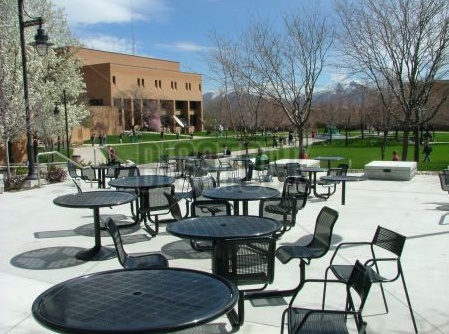
Hey, where'd everyone go?
When’s the Worst Time to Tour Schools?
Colleges have a different schedule than do high schools. You can take advantage of your vacation times to visit colleges when classes are in session, but you also should probably plan to avoid college break times.
In addition to winter break, colleges have breaks over Thanksgiving and typically in the second or third week of March (spring break!). Before the December holidays vacation, they usually have a “reading period,” a week or two during which students study for finals and then take their exams. Classes won’t be in session. Reading periods and exam weeks usually precede the end of the fall semester and end of the spring semester.
Finally, if you’re interested in visiting admissions offices, then you should check ahead to make sure this is a possibility. Admissions officers get busy with application review season in March and April , so if you’d like to visit at this time and meet with an admissions officer, just make sure they have time to talk with prospective students.
However, you can still gain a lot from walking around campus and checking out the facilities and the surrounding city even if classes aren’t in session. But if you plan ahead, you can make the most of your visit by visiting during the semester and getting the truest sense of the college in action.
Apart from signing up for the tour, you should also prepare some questions to connect with your tour guide and find out more information about the college.

Before you visit, prepare some questions to ask your college tour guide!
What to Prepare for Campus Tours
College tour guides are there to help! Most tour guides are current students who are enthusiastic about sharing info and insight into the school. Make the most of your visit by preparing questions to ask. It’s especially important to prepare a list of questions if you’re meeting with an administrator.
So what should these questions look like? They might include,
- How much time do you typically spend on homework?
- What’s the average class size? (You may specify this question for a certain department.)
- What kind of orientation programs are there for freshmen?
- Are there opportunities for research in nanoengineering (or whatever the subject might be)?
- Can you talk about the community service clubs?
- Is it common to study abroad ?
- What are the dorms like?
- How would you rate the food, on a scale from decent to inedible?
Do a lot of students belong to frats or sororities?
Really, you can ask anything you want to know that’s specific to your unique interests or goals. Find out answers to your questions that aren’t already available on the school website.
Now that you’ve made it this far, let’s summarize what you need to remember about why, when, and how to visit your prospective colleges.
To Sum Up...
If you're able to find the time, money, and transportation to visit your colleges, I highly recommend doing so. Not only will you learn a ton of important info about the school, but you'll get to see and sense the general atmosphere of the campus and its surrounding area. Since this is the place where you could learn, live, and grow for four years, you want to make sure it fits your goals and personality.
Most schools give juniors three to four excused absences to tour, plus you can go during your winter or spring breaks since colleges have different vacation schedules. Try to prioritize visiting when classes are in session. That way, you'll have more chances to sit in on a lecture, meet with administration or faculty, and get an authentic sense of the college when it's in full swing.
Sign up for tours online, and spend plenty of time exploring. Show up with some questions in mind. Your tour guide can especially give you genuine insight into the student experience and social scene on campus.
Visiting colleges will be a huge help in determining where you do and don't want to apply. In addition to weighing the courses and facilities the colleges have to offer, you should also make sure to listen to your intuition.
Take some time alone to sit on a bench or steps outside the library, look around, and see if you can picture yourself there. If you feel it would be a great fit, you may, after your visit, be even better equipped to communicate why in your application. Then, hopefully, admissions officers will feel the same way!
What's Next?
Just as you should explore the surrounding environment when you visit college campuses, you should also take the time to think about what kind of place would best fit you. Do you want to go to a big school or a small school ? Do you want to stay close to home or look farther away ? Check out these guides for more on how to decide and what other factors to consider when creating your college list.
Another concern when making your college list may be financial aid. If this is important to you, check out these 27 colleges with the best financial aid!
Want to improve your SAT score by 160 points or your ACT score by 4 points? We've written a guide for each test about the top 5 strategies you must be using to have a shot at improving your score. Download it for free now:

Rebecca graduated with her Master's in Adolescent Counseling from the Harvard Graduate School of Education. She has years of teaching and college counseling experience and is passionate about helping students achieve their goals and improve their well-being. She graduated magna cum laude from Tufts University and scored in the 99th percentile on the SAT.
Student and Parent Forum
Our new student and parent forum, at ExpertHub.PrepScholar.com , allow you to interact with your peers and the PrepScholar staff. See how other students and parents are navigating high school, college, and the college admissions process. Ask questions; get answers.

Ask a Question Below
Have any questions about this article or other topics? Ask below and we'll reply!
Improve With Our Famous Guides
- For All Students
The 5 Strategies You Must Be Using to Improve 160+ SAT Points
How to Get a Perfect 1600, by a Perfect Scorer
Series: How to Get 800 on Each SAT Section:
Score 800 on SAT Math
Score 800 on SAT Reading
Score 800 on SAT Writing
Series: How to Get to 600 on Each SAT Section:
Score 600 on SAT Math
Score 600 on SAT Reading
Score 600 on SAT Writing
Free Complete Official SAT Practice Tests
What SAT Target Score Should You Be Aiming For?
15 Strategies to Improve Your SAT Essay
The 5 Strategies You Must Be Using to Improve 4+ ACT Points
How to Get a Perfect 36 ACT, by a Perfect Scorer
Series: How to Get 36 on Each ACT Section:
36 on ACT English
36 on ACT Math
36 on ACT Reading
36 on ACT Science
Series: How to Get to 24 on Each ACT Section:
24 on ACT English
24 on ACT Math
24 on ACT Reading
24 on ACT Science
What ACT target score should you be aiming for?
ACT Vocabulary You Must Know
ACT Writing: 15 Tips to Raise Your Essay Score
How to Get Into Harvard and the Ivy League
How to Get a Perfect 4.0 GPA
How to Write an Amazing College Essay
What Exactly Are Colleges Looking For?
Is the ACT easier than the SAT? A Comprehensive Guide
Should you retake your SAT or ACT?
When should you take the SAT or ACT?
Stay Informed
Get the latest articles and test prep tips!
Looking for Graduate School Test Prep?
Check out our top-rated graduate blogs here:
GRE Online Prep Blog
GMAT Online Prep Blog
TOEFL Online Prep Blog
Holly R. "I am absolutely overjoyed and cannot thank you enough for helping me!”
What are your chances of acceptance?
Calculate for all schools, your chance of acceptance.
Your chancing factors
Extracurriculars.
10 Tips for Your Child’s College Visit

A campus visit is a long-standing tradition among high schoolers and an important part of the college applications journey. Offering information and insight not found in brochures, campus visits enable teens to chat with current students, eat in dining halls, visit dorms, and even attend classes. In fact, many students report that they don’t know if a college is a good fit until they set foot on the campus.
While campus visits are clearly important, families often struggle with the logistics. How many schools should your teen visit and when? How can you make out-of-town trips as affordable as possible? Read on to discover CollegeVine’s top ten tips for a successful college visit.
When Should Your Child Consider Visiting a College?
Choosing the right time for a college visit involves various considerations. Not only do you have to base decisions on your family’s schedule, but you also have to look at your student’s responsibilities with regard to coursework and extracurriculars.
So, when’s the best time to take that road trip (or flight) to an out-of-state school? It’s best to visit a school when class is in-session, since high schoolers will get a better feel of the campus atmosphere; they may also be able to meet current students and professors. Consider planning trips during the fall or spring of sophomore or junior year. Spring break is particularly convenient, because students won’t have to miss class. College spring breaks are often at a different time, so school should be in session. Whenever possible, students should visit schools before applications are due. That way, they don’t waste time or money applying to schools that they wouldn’t be excited to attend.
10 Tips for Making the Most of a College Visit
Wondering how to make the most of your teen’s campus visits? Check out CollegeVine’s tips for ensuring a successful school trip:
1. If finances are tricky, take a virtual tour, or consider diversity fly-in programs
Sometimes it just isn’t possible to visit all your child’s schools in-person, and that’s totally normal. Most families usually just visit a handful of out-of-state top choice schools and some nearby universities. For the schools you can’t make it to, consider touring them virtually. Harvard is just one of many schools that offer guided virtual tours you can take from the comfort of your living room. See spots like dormitories, classrooms, libraries, and even the dining hall. If you can visit in-person, you might even use this tool before visiting, to get a better sense of campus landmarks.
For high-achieving, underrepresented students, there are also diversity fly-in programs. Certain schools will pay for your student’s out-of-state visit (flights and all!) if they fall into this category. Students apply for these opportunities, and visits usually take place in spring of junior year, or fall of senior year. High schoolers get the chance to stay with a current student, participate in programming, and eat from the dining hall for free. See our list of popular schools that offer fly-in programs .
2. Set up travel fare alerts
I f your student plans to apply to many out-of-state schools, you can cut costs by setting up flight price trackers for the cities where their schools are located. That way, you’ll receive an email when a low or “mistake” fare pops up. Popular search engines that offer this feature include Google Flights, Secret Flying, Hopper, and Kayak.
3. Add a tour to your family vacation
Planning a family vacation this year? Consider choosing a destination near one or more of the schools your child hopes to visit. For example, if your teen is looking at several schools in California, you could schedule a family trip to Los Angeles. Hit up Disneyland and the San Diego Zoo in between trips to UCLA and USC.
4. Start with a local school
One way to ease into visits is to start with a school close to home. Touring a nearby college gives students a chance to discover what factors are most important to them, such as living on-campus or attending a school with strong athletic culture. Once your child determines what’s important to them, they can re-evaluate their college list and remove schools that don’t make the cut.
5. Get social
Students can also use social media to research colleges and further refine their lists. Encourage your child to check out the Facebook and Instagram pages for their top-choice schools. Your teen will get a better sense of campus culture and learn about school activities.
6. Talk to students
Interacting with students in-person can be helpful as well. When you do visit campuses, aim to find a group of students that shares your child’s academic or extracurricular pursuits. For example, if your teen is passionate about writing, see if they can sit it on a creative writing course or meeting of the school’s literary magazine. If you can’t make the visit, try to find current students from your town that your child might be able to chat with. It’s crazy how connected the world is; you may be able to find a current student just by asking in your circles. Your student’s high school counselor should also know if there are any alumni now attending your teen’s dream school.
7. Assess the Culture
Finding a good fit is about more than academics. If you want to get the most out of your college visits, strive to get a sense of the overall culture of the school. Do students attend sports games on weekends? Do they participate in fraternities and sororities? Is there a strong musical theater presence? Tours are great for assessing what activities and events are popular at a given institution.
8. Meet an admissions officer.
No, meeting the admissions officer won’t guarantee preferential treatment down the line. However, it does enable them to put a face to the name on your college essay, and it also shows that you’re passionate about the school. Schedule an interview if you can; if not, drop by the admissions office and introduce yourself to whoever’s working.
9. Don’t forget academics
It’s easy to get wrapped up in the fun aspects of college, like student organizations and extracurriculars. However, students should remember to pay attention to each school’s academic offerings. Try to sit in on a class, speak to a student with your prospective major, or meet a professor.
10. Take notes
If your teen is visiting multiple colleges, it’s easy for the various tours to blend together. (Which school had the big dorm rooms, again?). If you want to keep the details straight, it’s wise to take photos and jot down your impressions immediately after the trip. Additionally, experts recommend limiting college tours to two a day so the experiences don’t blur.
Does your teen want access to expert college guidance — for free? When they create their free CollegeVine account, they will find out their real admissions chances, build a best-fit school list, learn how to improve their profile, and get their questions answered by experts and peers—all for free. Encourage them to sign up for their CollegeVine account today to get a boost on their college journey.
Related CollegeVine Blog Posts


- 888-975-9455
- Let's Talk
Campus Visits
College visits and tours.
By visiting college campuses in person, you can make college application decisions with all five senses.
With so much information available about colleges, it would be easy to see the list of schools you’re interested in applying to top 20 or 30 colleges. Trying to narrow down your college choices so that you apply to the institutions that fit your personality and goals the best based solely on what you’ve heard or read can be difficult. By visiting campuses in person, you can make college application decisions with all five senses. At Going Ivy, our professional counselors can help you with your campus visit planning so you derive the most benefit from your visits and so that you are memorable to the admissions staff.
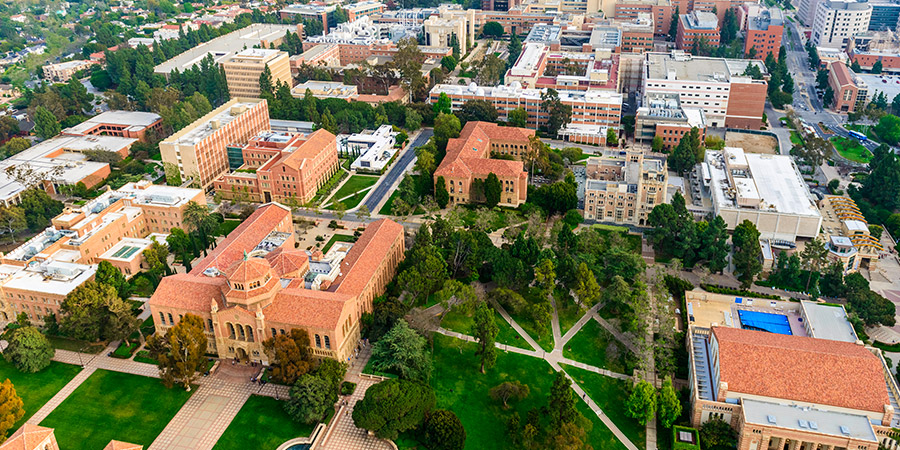
Using the Campus Visit to Your Advantage
The Going Ivy team is made up of graduates from some of the most elite schools in the country. We understand how important it is to choose a school that fits you. While the thousands of U.S. colleges and universities are well-respected and rigorous, they are each different in their individual cultures, campus neighborhood, pace and more. We can help you plan your visits and prepare for them so that you are better able to determine which school you want to attend, researching the institutions and planning questions to ask of students and staff while you’re there.
Why Visiting is Important
Since your chosen college will be where you live for four years, it is important that you choose the school at which you’ll be the happiest. You don’t want to go through the extreme effort of getting into an exclusive school only to find that just don’t feel like you’re home. This makes it very important that you don’t simply select a school because of its academics or reputation. In order for you to obtain a better picture of a college’s individual culture, it is important for you, whenever possible, to go there. You can then talk to the admissions staff and students, see what the housing is like, visit the library and eat in the dining hall. This can give you a more rounded perspective on the school.
Do Background Research Before Deciding to Visit a School
Before even deciding on which schools to visit, Going Ivy can help you narrow your list by researching the schools. You can learn a lot by reviewing a school’s website, reading its blog, checking out its social media pages and reviewing its campus newspaper and college brochures. If you see that the school is not very interactive with its students or doesn’t seem to have the right feel for you, then you can cross it off your school application and visiting list. This may allow you to reserve your visiting schedule for the schools that are most interesting to you.
Schedule Your Visit Ahead of Time
If you have the opportunity to visit a college, even if it’s during your family summer vacation after your sophomore year of high school — schedule it. Secure a spot on the college’s planned information session, and if you can request meetings with anyone beyond the generic tour, do it. If you schedule a tour toward the end of your junior year or into your senior year, you’ll want to let the college staff know that you will be applying or have applied. If the college allows interviews for applicants, this is a great opportunity that you should practice and prepare for.
Get Your Name on Your School’s Radar
All colleges work to protect their reputations, and one way they do this is by striving for a high yield percentage. A school’s yield is its percentage of admitted applicants who choose to attend, and it affects the rankings of colleges. When you visit a college and apply early, the school is likelier to believe that you are highly interested in attending, which may translate into your application getting a careful of perhaps more favorable look. You don’t want the school never to have seen your name before they see your application. Sign up for the school’s information list and social media posts. When you schedule your campus tour, make certain to ask for the name and contact information for the person who is designated for handling travel for students from your region. This person will likely be the first admissions officer who will review your application materials when you submit them. Follow up with this person after the tour with an email to ask additional questions and thank them for their time.
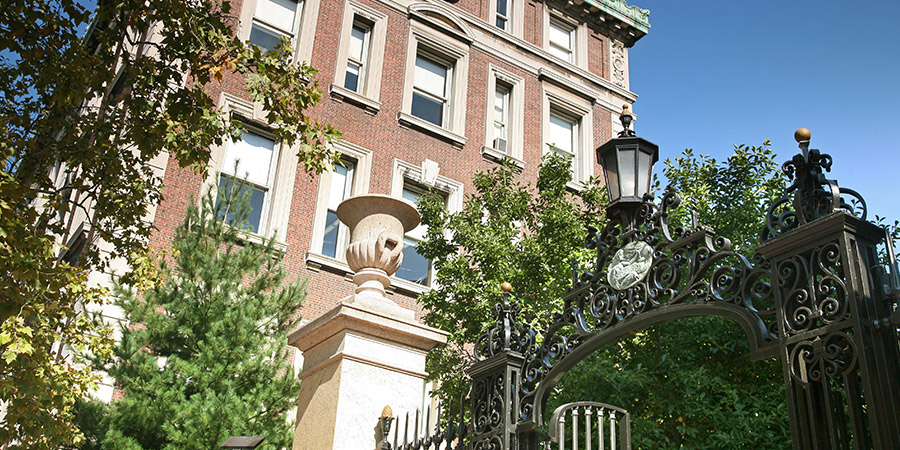
Get Beyond the Generic Tour
During your visit, you should plan to go beyond the simple student-led tour and information session. You should have come up with a list of questions that you have to ask during the information session so that you can elicit more information about the school, what it offers and what it is like to attend. In addition, most schools will let you sit through a class in your interest area if you give them advance notice and coordinate it with the proper people. It is also a good idea to eat in the dining hall so that you can get an idea of how the students interact with each other. Many schools offer more formal welcome sessions with a organized day or overnight visit to the campus for high school juniors or seniors. These visits are helpful as you make your decision to apply and can offer great material for your application, but you must register for them in advance.
Don’t be afraid to ask students about what it is like to attend the school. If you’re visiting with your parents, split up for at least a few minutes to get your individual impression of the campus and where you’d be comfortable meeting friends, reading, grabbing a quick snack, or getting some exercise.
If you are planning to visit several universities, we recommend that you not visit more than two in a day. You will need to give yourself enough time on each campus to get a feel of what it is like. When you visit, use your phone to keep track of your observations and take pictures to help trigger memories later, but don’t be on your phone around the admissions staff.
Getting Help from Going Ivy
Our expert counselors can explain what we have experienced at the different institutions, and what you might look for or ask about on your visits. We also understand that not everyone will be able to visit schools in person, so we offer a virtual reality tour by using Oculus Rift and 3D technology. We can also help you to plan your questions in advance and schedule your visits so that you can get the most benefit out of them. To learn more about our services, contact us today.
Clients Accepted To
Meet our team of former admissions officers, Ivy League and top school graduates, and tutors.
Videos & Testimonials
“A breath of fresh air." Kilroy Family Testimonial
"A coach to guide them." Wissink Family Testimonial
Call Now 888-975-9455 Free, No Obligation Consult
Send us a message.
- Email This field is for validation purposes and should be left unchanged.
Free, No-Obligation Consult

- Staff & Faculty
- Current Students
- Parents & Family
- Visitors & Community
- Corporate Partnerships
- Support Marymount
- Marymount Shuttles
- Student Counseling Services
- News & Events
- Campus Safety
- Faculty & Staff Directory
- My Marymount
- Registrar’s Office
- Library & Learning Services
- Campus Ministry
- Human Resources
- Office of the President
- Marymount at a Glance
- Points of Pride
- Our Mission, Vision, & Plan
- Capital Location
- Our History
- The Rixey History
- Our Inclusive Community
- Marymount’s Economic Impact
- Involvement & Service
- Distinguished Speakers
- Map and Directions
- Visit Marymount
- Admitted Students
- Undergraduate Students
- Graduate Students
- Online Students
- Non Degree Students
- Summer Programs
- Early College Programs
- Scholarships & Aid
- Early Learning Academy
- New Student Scholarships
- How to Apply
- Types of Aid
- Graduate Student Aid
- Military & Veteran Services
- Financial Aid FAQs
- Tuition & Fees
- Satisfactory Academic Progress Standards
- Office of the Provost
- Academic Calendar
- Majors & Programs
- Online Programs
- Services & Resources
- College of Business, Innovation, Leadership, and Technology
- College of Health and Education
- College of Sciences and Humanities
- Access, Belonging, Inclusion, Diversity, and Equity Hub
- Marymount Global
- Center for Optimal Aging
- Saints’ Service Network
- Faculty Research and Experts
- Commencement
- Student Affairs Administration
- New Student Orientation
- Dining Services
- International Student & Scholar Services
- Student Activities and Events
- Student Accounts
- Commuter Students
- Student Health and Well-being
- Community Standards and Title IX
- Ministry, Activities & Leadership
- Careers, Internships & Employment
- Auxiliary Services
- Campus Safety & Emergency Management
- Student Government Association
- Student Success and Well-being
Home News Why you should visit colleges during your junior year
Why you should visit colleges during your junior year

It’s your junior year of high school, and you’re eagerly awaiting all the treats your senior year has to offer — prom, senior privileges, graduation and college decisions! But try not to put off college visits , tours or interviews to your senior year. Exploring your college options during your junior year will give you more time to find the college that is perfect for you.
Here are three reasons why you should visit colleges during your junior year.
1. Get a better sense of what you’re actually looking for in a college.
Are you not quite sure what your ideal ‘dream school’ looks like? Don’t worry! If you start visiting colleges during your junior year, you’ll have plenty of time to figure out what you do or don’t like. You can visit plenty of different kinds of schools — large, small, private, public, conservatory or vocational. Your options become limitless!
Maybe you already have an idea of which colleges you’d like to apply to. Visiting them early can help you narrow down and categorize your choices. You can get a better feel of which schools might be a reach to get into, which ones are in your target zone or which ones are good safety schools. You’ll also get a better feel for your favorites, and can spend more time on the applications for those schools.
2. Get a better sense of what colleges are looking for in students.
You probably won’t start working on your college applications until the summer before your senior year at the earliest. Visiting colleges and talking to tour guides or admissions counselors before you apply can help you gauge what the college is looking for in applicants. Then, you’ll have plenty of time to tailor the essay or free response portions of your application to that particular college!
Visiting colleges during your junior year will also let you get acquainted with different college campuses before you’re in the throes of your senior year. Maybe you only visit large, sprawling campuses at first, and decide a big school isn’t the best choice for you. Since you visited months before you have to apply, you still have time to peruse your options, and check out some smaller schools or schools with a more ‘intimate’ feel.
3. Find out what it will take to succeed at different schools.
You can only learn so much about a school from its website. Success in college isn’t all about academics — every school has a different campus culture, as well as particular ways that classes are constructed (large lecture or small seminar classes, or a mix?). Plus, the community surrounding a campus varies. Visiting early will give you time for a reality check — can you see yourself spending the next few years of your life at this school? Is a school located in the midst of an expensive city that you can’t afford right now? Can you see yourself fitting in with the students you see hanging around campus?
Visiting colleges during your junior year will also motivate you to finish strong. It’s easy to get distracted with all the excitement of senior year, and to lose sight of your academics a bit. But once you’ve been to college campuses and had a little taste of the college scene, you’ll be inspired to keep your grades a top priority so you can get accepted to the school of your dreams!
Plan ahead and give yourself enough time to put thought into your college applications and decisions. This time shouldn’t be stressful — it’s exciting! You get to plan the next steps of your life, and you have so many different options to choose from. Starting to explore these options in your junior year will help your final year of high school go smoothly, and you’ll be walking across that graduation stage before you know it!

(703) 522-5600
Privacy Policy - Terms of Use
- Contact CONTACT MARYMOUNT
- Directions MAPS & DIRECTIONS
- Careers CAREERS AT MARYMOUNT
- Student Jobs JOBS ON CAMPUS (MU STUDENT)

Wisconsin basketball junior guard enters transfer portal
Wisconsin Badgers junior guard Isaac Lindsey entered the transfer portal on Tuesday morning.
2023-24 was the former walk-on's third year with the program after starting his collegiate career at UNLV. The Mineral Point, Wisconsin native scored just 10 points this past season, in addition to recording six rebounds, three assists and four steals in only 59 total minutes of action.
Related: Tracking Wisconsin basketball’s reported transfer portal visits and targets
His Wisconsin career ends with per-game averages of 4.7 minutes, 1.0 points, 0.5 rebounds, 0.1 assists and 0.1 steals.
Lindsey is the sixth Badger to enter the portal this offseason, that list including star guard A.J. Storr and fan-favorite Connor Essegian. The program does not have a portal commitment to this date, though is reportedly in hot pursuit of some of the best players available .
https://twitter.com/McNamaraRivals/status/1777720569703637144
Contact/Follow @TheBadgersWire on X (formerly Twitter) and like our page on Facebook to follow ongoing coverage of Wisconsin Badgers news, notes and opinion. Follow Ben Kenney on X .
This article originally appeared on Badgers Wire: Wisconsin basketball junior guard enters transfer portal
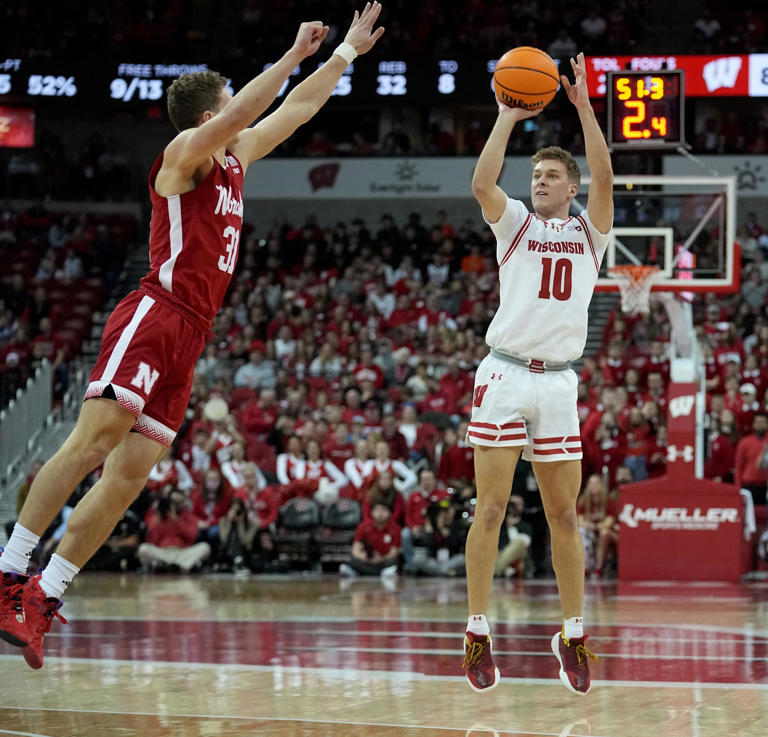

IMAGES
VIDEO
COMMENTS
The spring of your junior year is a good time if you've already researched colleges. Spring break is also good if you play fall sports or are considering applying under early action or early decision plans, which usually have application deadlines in November of your senior year. Early fall is also a good time for seniors to visit.
Junior year of high school is a great time to visit college campuses. College visits for high school juniors will help them learn about colleges and decide where to apply. During freshman and sophomore year of high school, students are starting to take advanced classes and trying out different activities as they prepare for college .
Step 2: Call the college or university's admissions office. Don't set up a visit online. Talk to an actual person. Or, if you do set up a visit online, call and make sure the admissions office received your scheduled visit—and that it didn't get lost in cyberspace. Have a detailed conversation about what you'd like to do when you're ...
The College Board recommends spring of junior year as a good time to visit campuses for students who have already done the research on those colleges. College visits are a good use of downtime ...
When planning your campus visits, make sure to allow time to explore each college. While you're there, talk to as many people as possible. These can include college admission staff, professors, and students. Take campus tours and, at colleges you're serious about, make appointments to have interviews with admission counselors.
The best time during the week is from Monday to Thursday. The campus is busy with students going from class to class or mingling around. The best season to visit colleges is at the beginning of the fall session. The time various from college to college and includes late-summer to the early of September. Spring time can also be ideal especially ...
This is a big decision no doubt. When it comes to college visits, then, it's no surprise that they can feel overwhelming. So here are 25 tips for how to have a great college visit that is smooth, informative, and even fun. 1. Visit during your junior year. It's a good idea to visit a college campus or two in the few first years of high ...
College visits can help you make an informed decision the best fit college. You don't have to wait until senior year. Consider college visits for juniors! ... Making all of these discoveries during your junior year will leave you free to focus on your academics, college applications, and test prep during your senior year.
College Preparation in 11th Grade. Use Junior Year to Create a Winning College Admissions Strategy. In 11th grade, the college preparation process accelerates and you need to start paying careful attention to looming deadlines and application requirements. Realize that in 11th grade you don't need to choose exactly where to apply yet, but you ...
And you can plan your own informal visit to a college campus. Take these important steps first: Visit the college's admissions website to get details about arranging for an in-person visit. Check with your school counselor to see if any campus tours are scheduled. Set aside time to be on your own. Walk around the public area.
Your College Visit Timeline. May, junior year: choose which colleges to visit; June, junior year: sign up for tours, set up interviews; Late August and early September: visit campuses; January or February, senior year: return to campus for interviews (if necessary) April, senior year: receive acceptance letters
BEFORE Your College Visit: 1. It is important to visit a college while classes are in session. Visiting a college without students on campus is a visit to see a bunch of beautiful (or not so beautiful) buildings. The best way to get a feel for the campus vibe is to plan your visit while the current students are at school.
It's a visit to confirm this is a place worthy of the time and energy of your application. Generally, most college visits before April of senior year serve the purpose of helping you decide if you want to apply - the one exception being visits to schools you're considering applying early decision to (a binding application pathway), or ...
Touring schools in the fall or spring of your junior year offers some important advantages over waiting until the summer or your senior year. Learn why, explore our advice on getting organized ("College Visits: Challenges and Solutions for High School Students"), and use the College Trip Planner to create your schedule. 1.
These are all important questions in the college preparation, selection, and application process. This is our Great College Advice for juniors to help them stay on track throughout the most important year in the college admissions timeline. The timeline is presented by season. One of the misconceptions of the college planning process is that ...
As you get closer to your junior and senior year of high school, college visits become more than just an opportunity to understand college more broadly. College visits for juniors and seniors can help students discover their preferences. At this stage of the college search process, students can begin to discern the type of college campus they ...
Diving Into Campus Visits. Visiting college campuses is something you can do at any point in your high school journey. But if you haven't done it by Junior Year, it's time to get a move on. Spending time on campus will give you the inside scoop on where you might be spending the next few years! Here are some tips for planning college visits:
The ideal timeline for visiting colleges depends on your schedule and availability; however, here's a general guideline to help you out: 1. Begin exploring colleges online (websites, virtual tours, info sessions) during your sophomore year or early in your junior year. 2. Plan to visit a few colleges nearby during the latter half of your junior ...
Reason #4: To Officially Demonstrate Your Interest in the School. So far, we've talked about how personally illuminating it can be to tour your college and its surrounding environment. You may have also heard that touring can strengthen your chances of admission, because it shows you did your due diligence.
1. Aim to visit colleges during junior spring. The ideal timing for college visits tends to be the spring semester of a student's junior year.
9. Don't forget academics. It's easy to get wrapped up in the fun aspects of college, like student organizations and extracurriculars. However, students should remember to pay attention to each school's academic offerings. Try to sit in on a class, speak to a student with your prospective major, or meet a professor. 10.
College Visits and Tours. By visiting college campuses in person, you can make college application decisions with all five senses. ... If you schedule a tour toward the end of your junior year or into your senior year, you'll want to let the college staff know that you will be applying or have applied.
It's your junior year of high school, and you're eagerly awaiting all the treats your senior year has to offer — prom, senior privileges, graduation and college decisions! But try not to put off college visits, tours or interviews to your senior year. Exploring your college options during your junior year will give you more time to find ...
Wisconsin Badgers junior guard Isaac Lindsey entered the transfer portal on Tuesday morning. 2023-24 was the former walk-on's third year with the program after starting his collegiate career at UNLV.